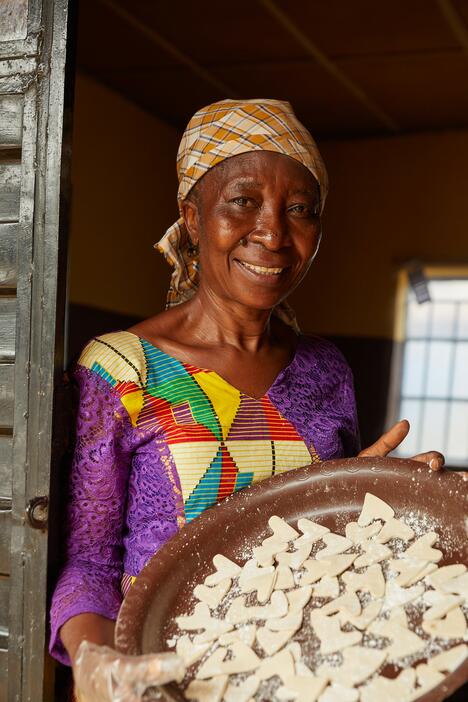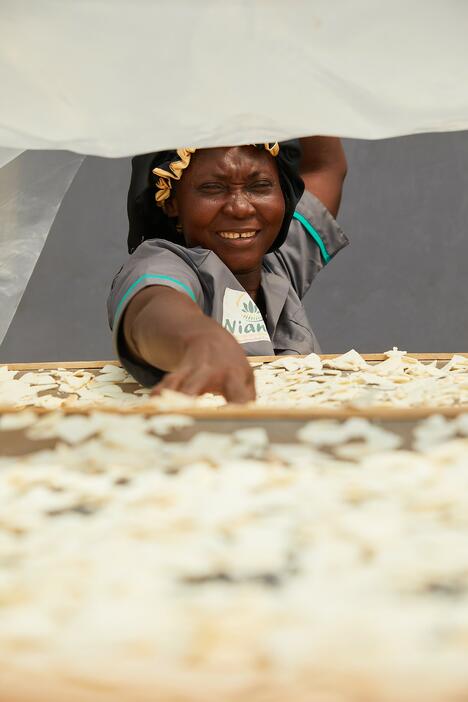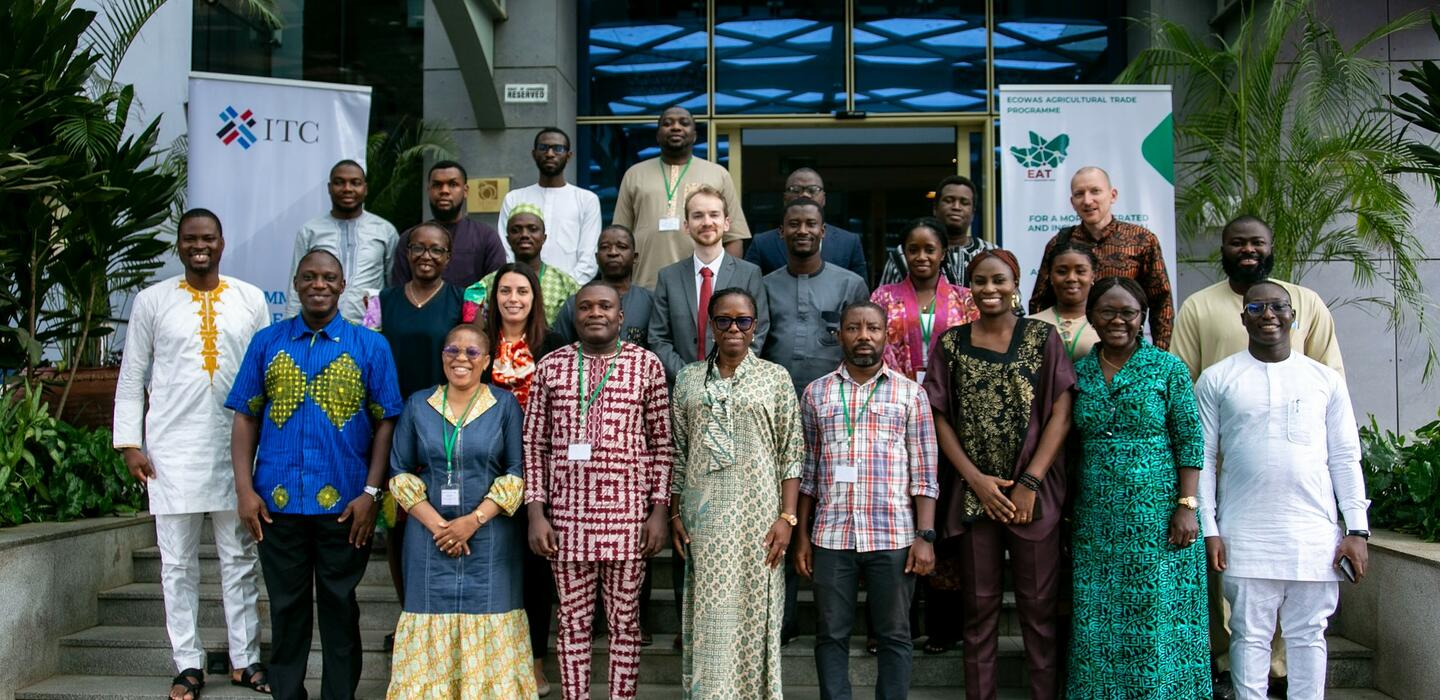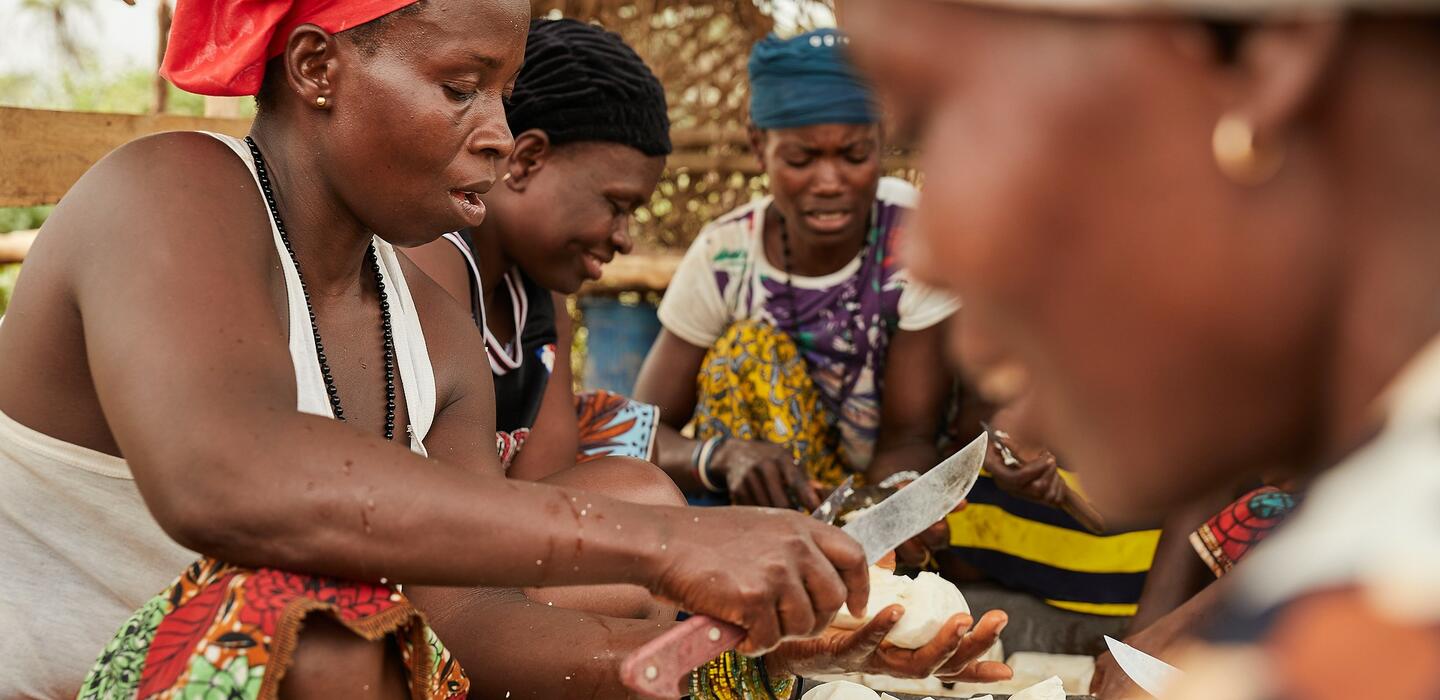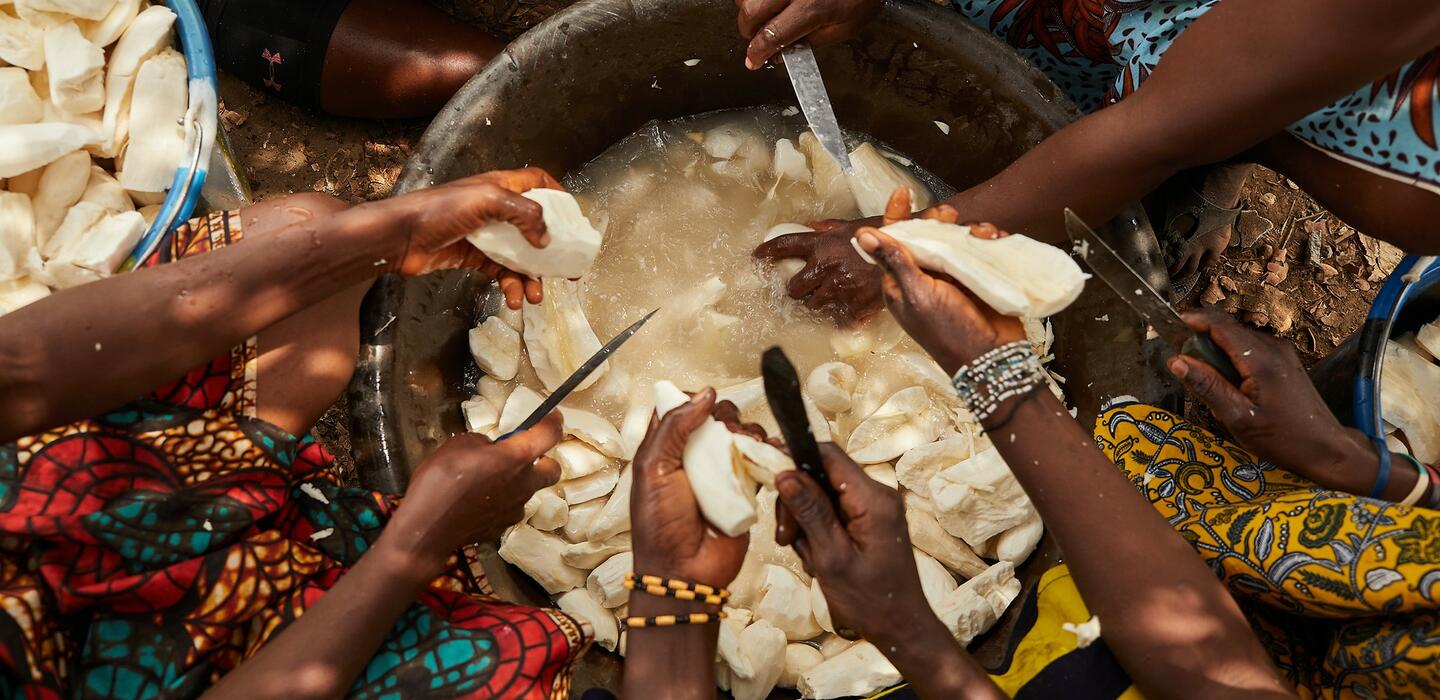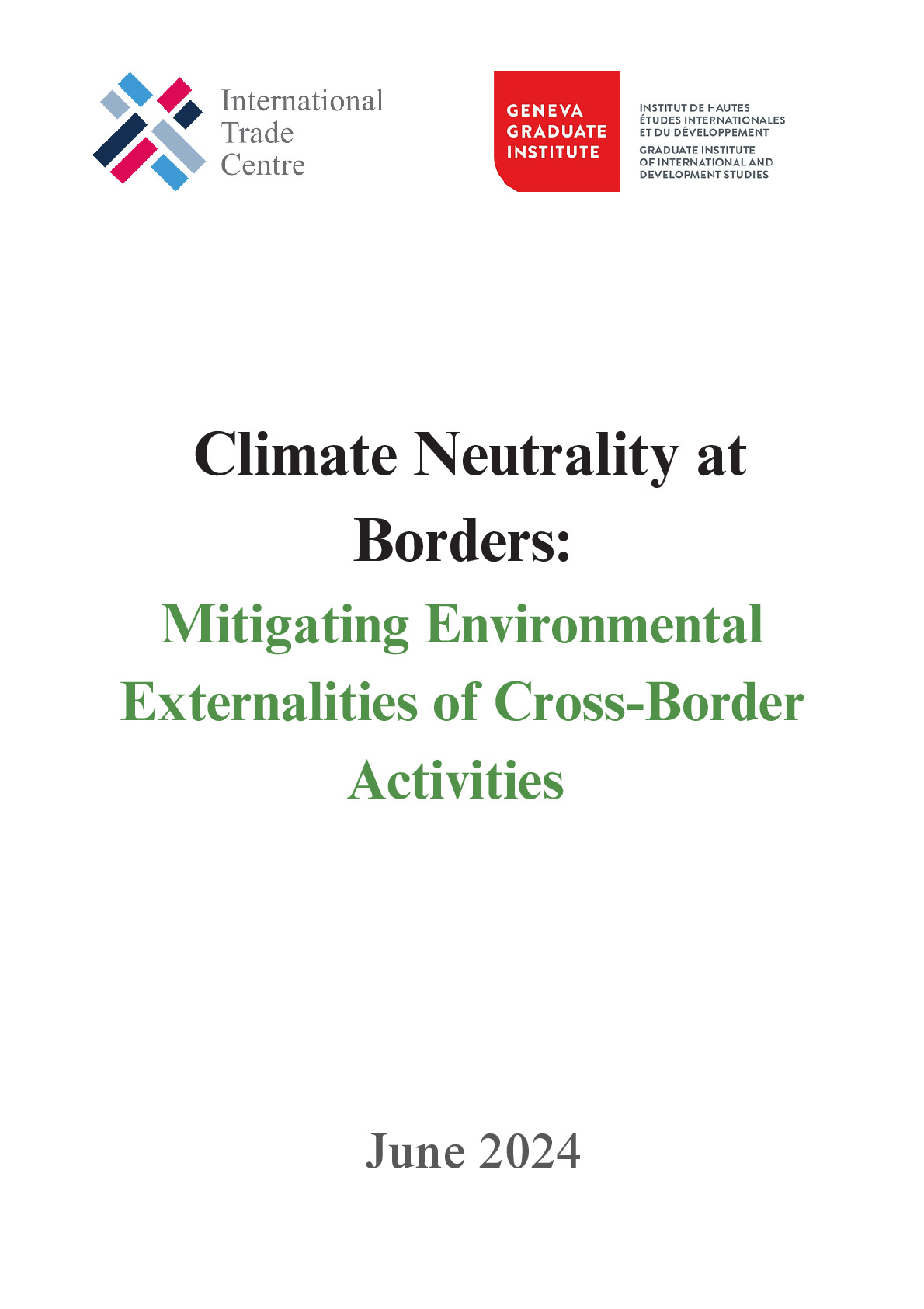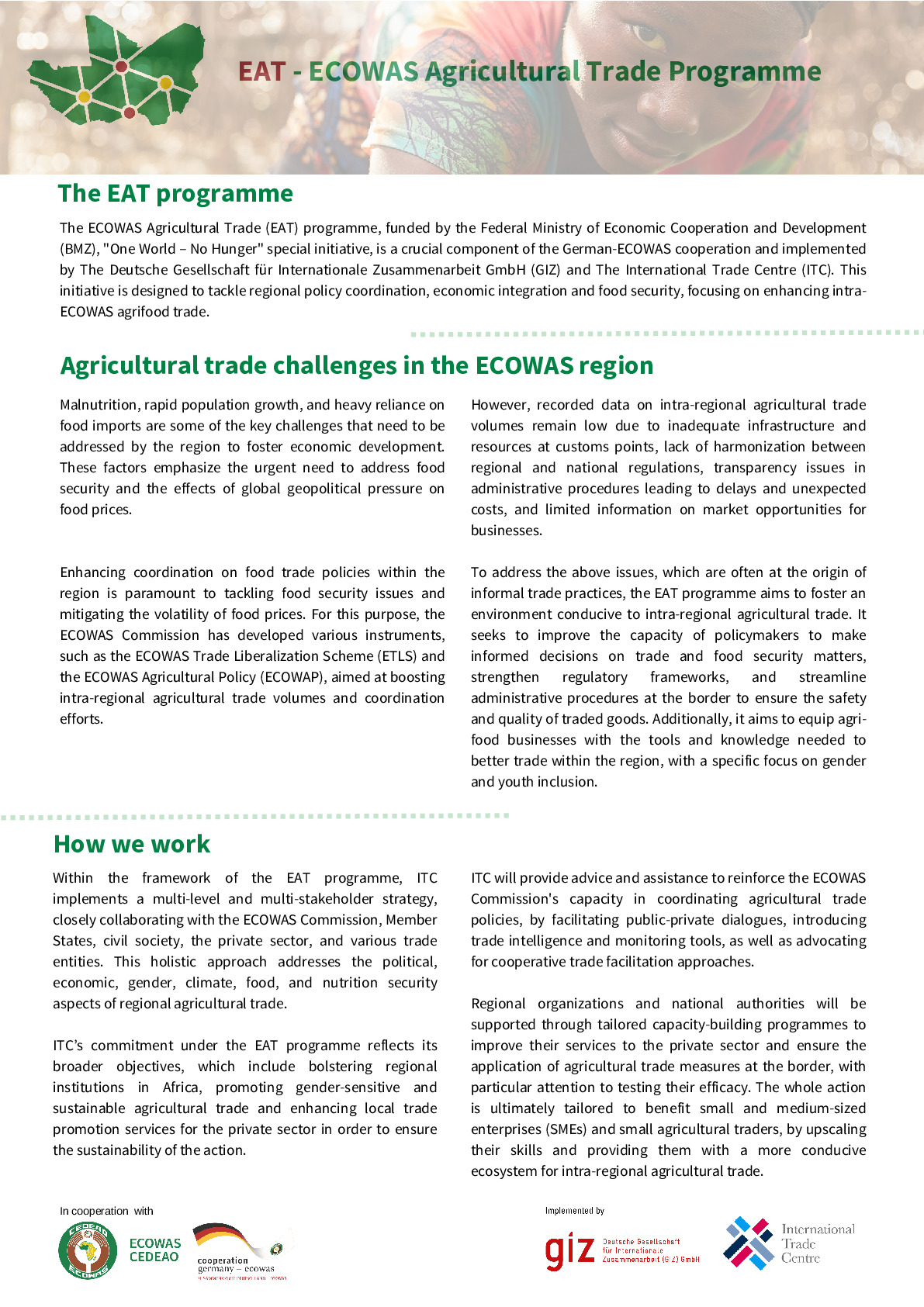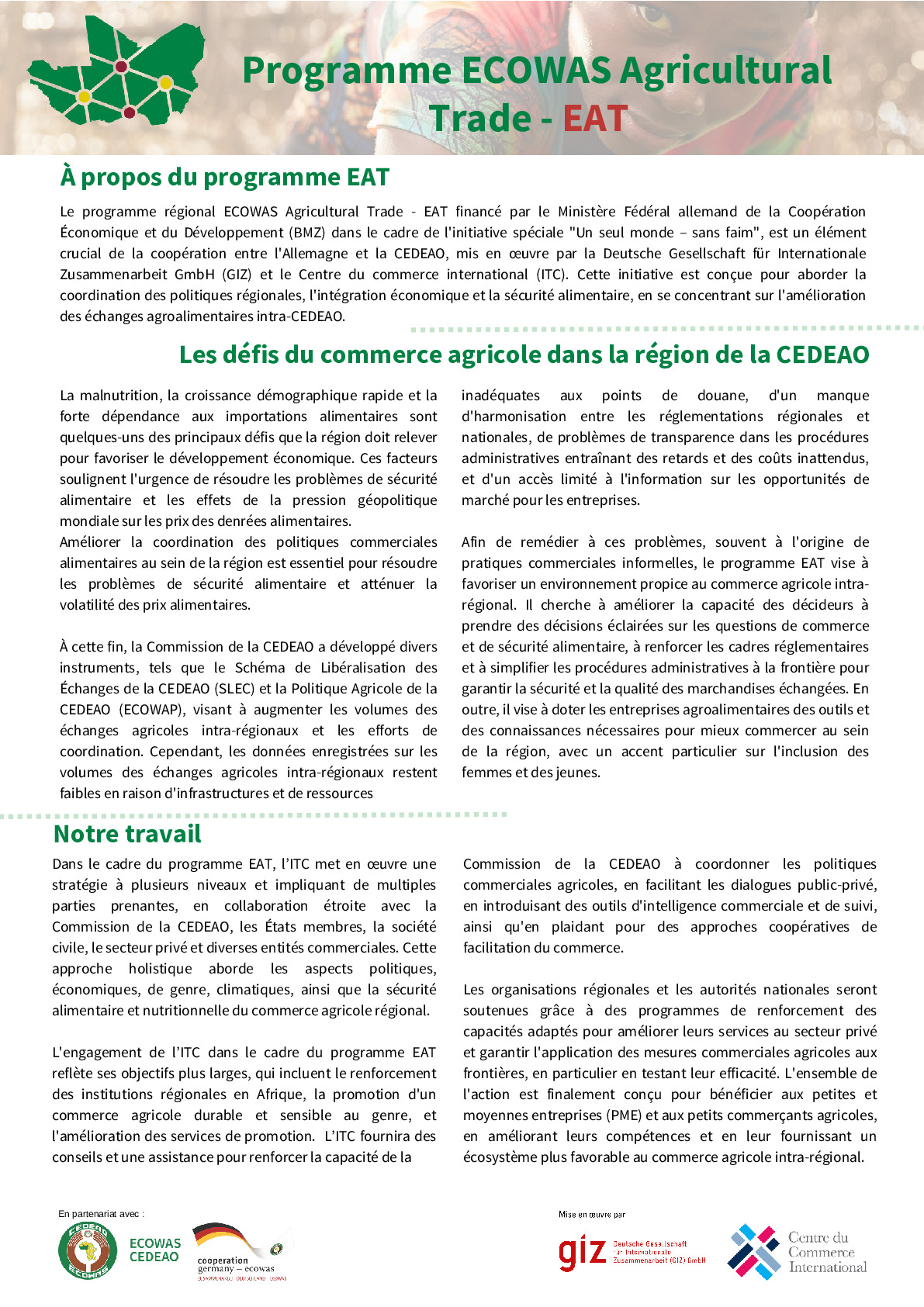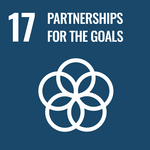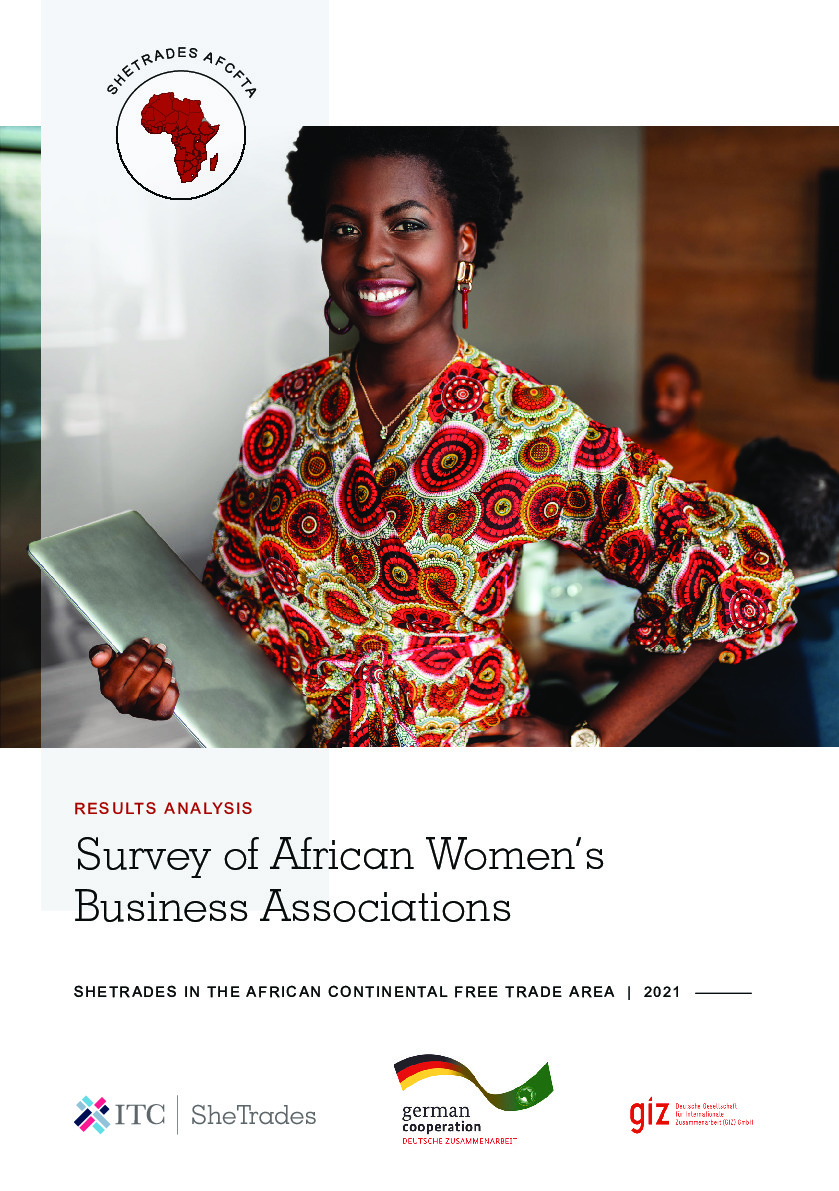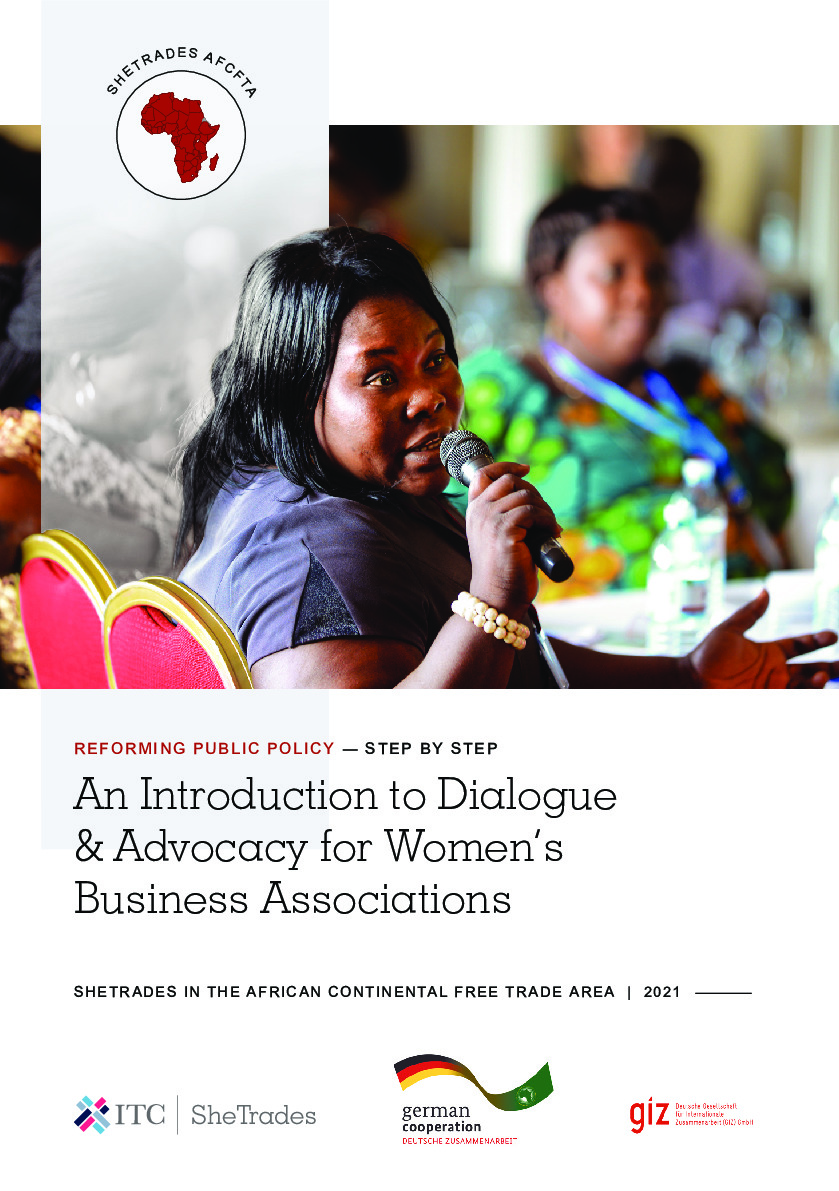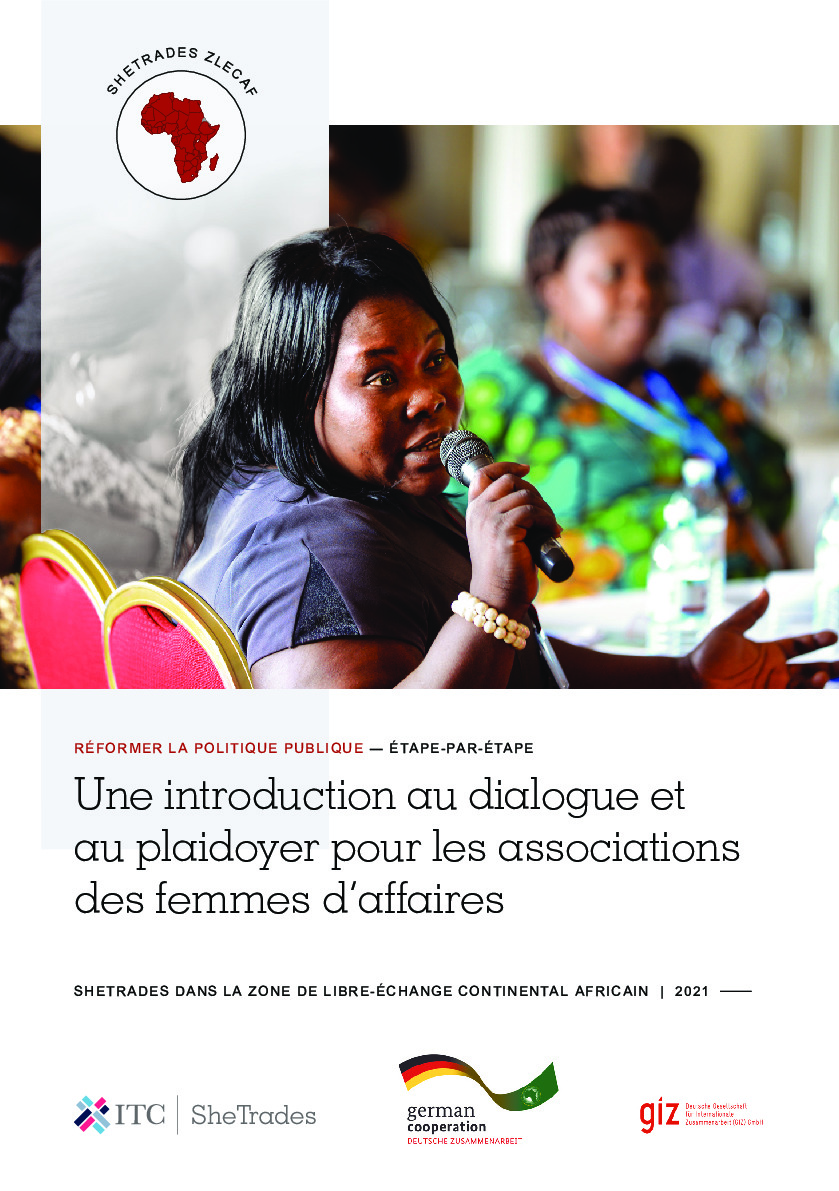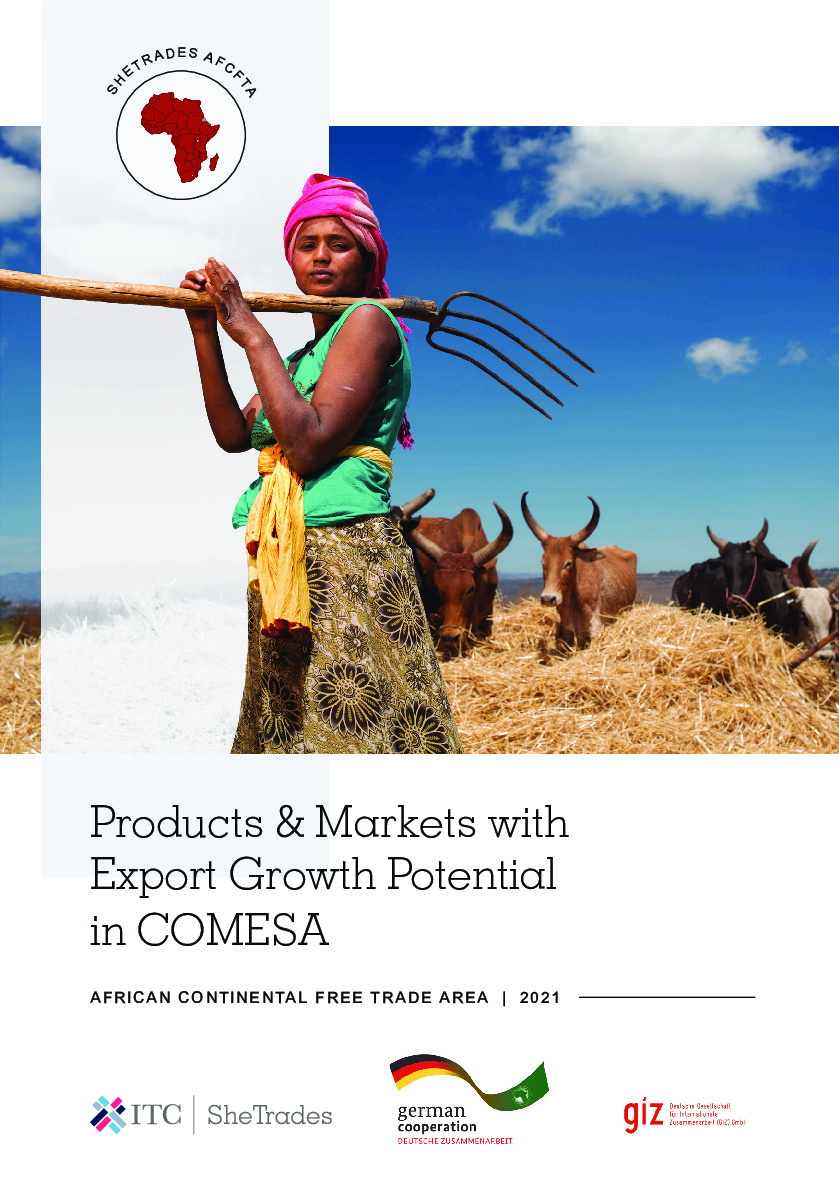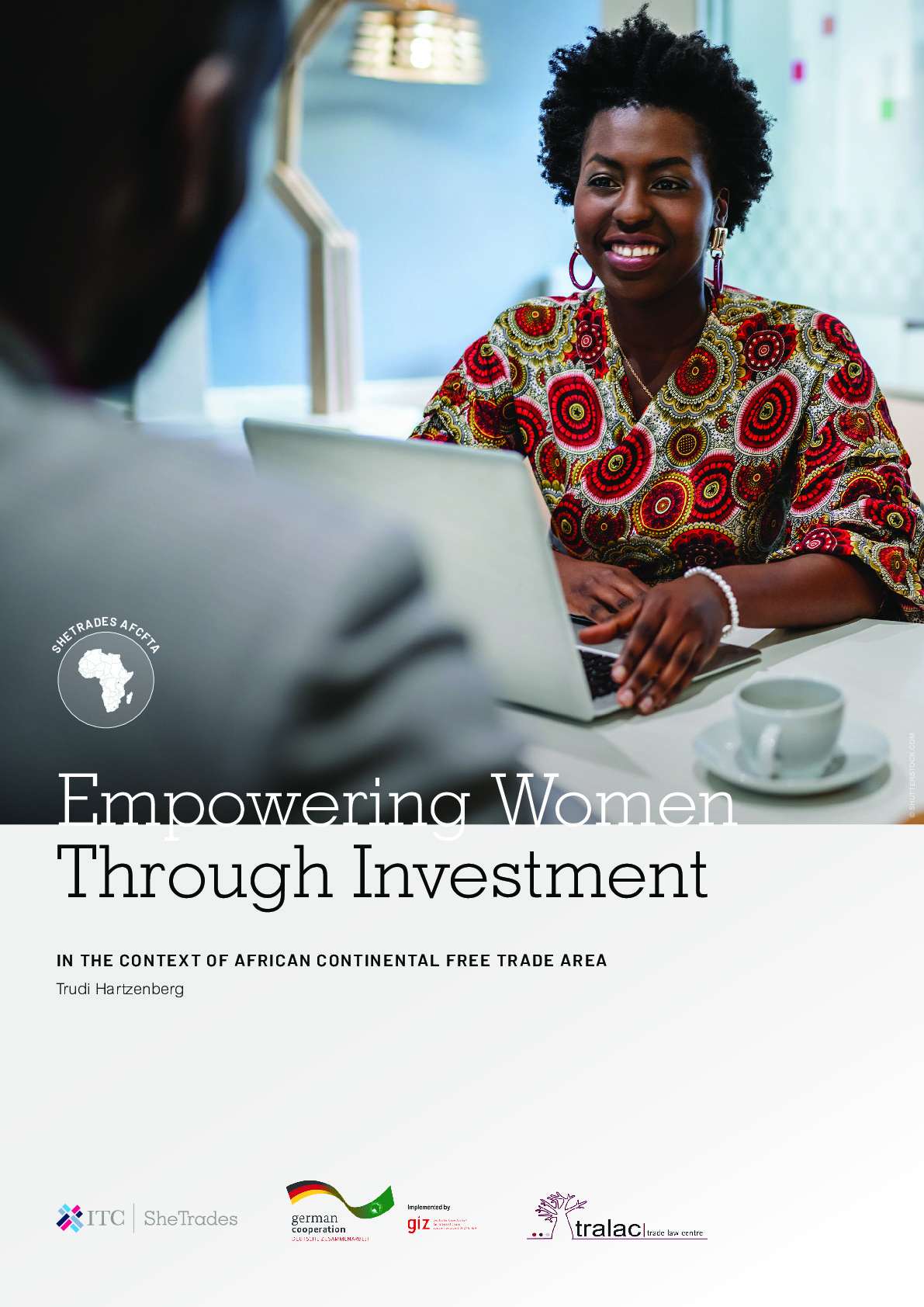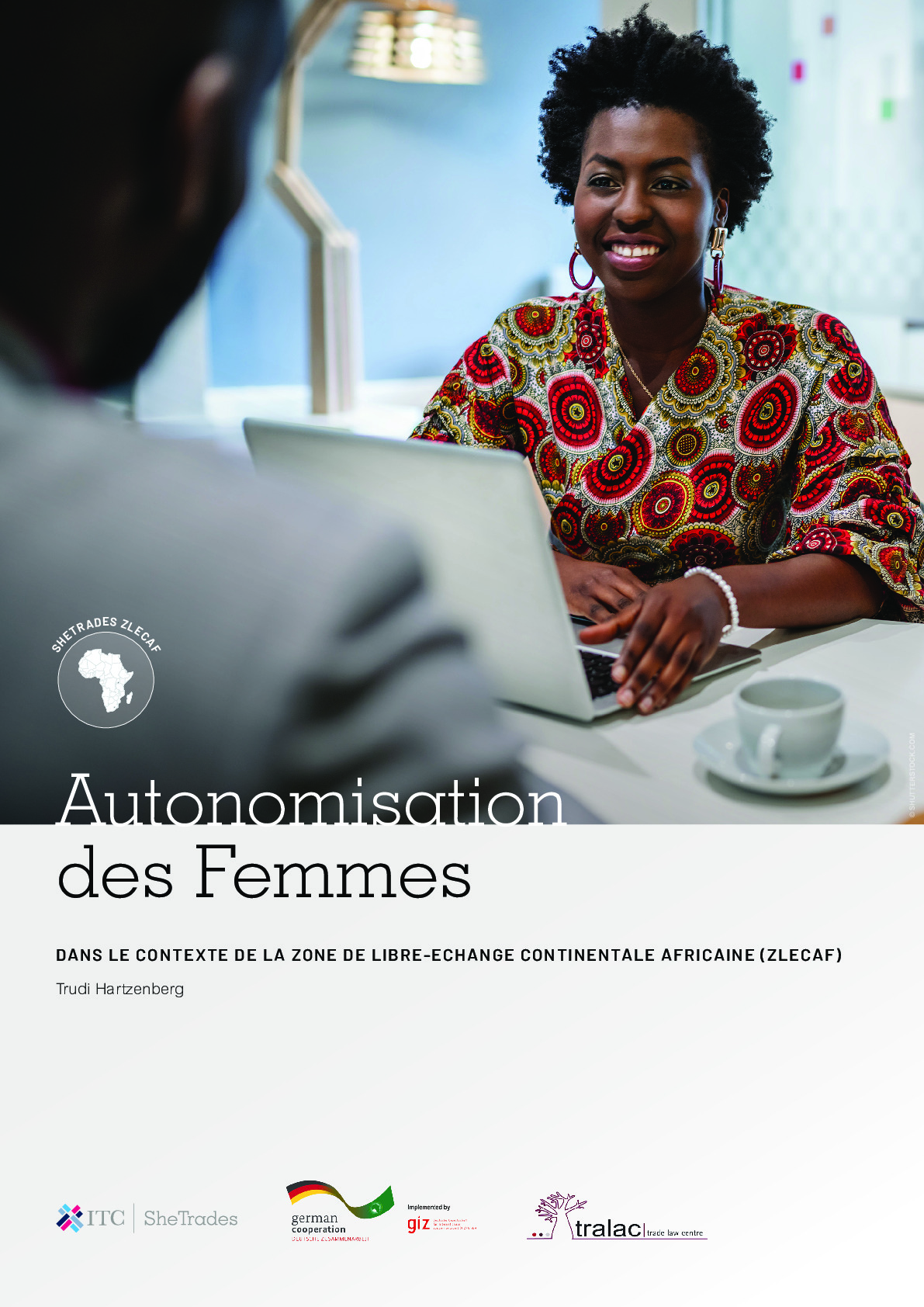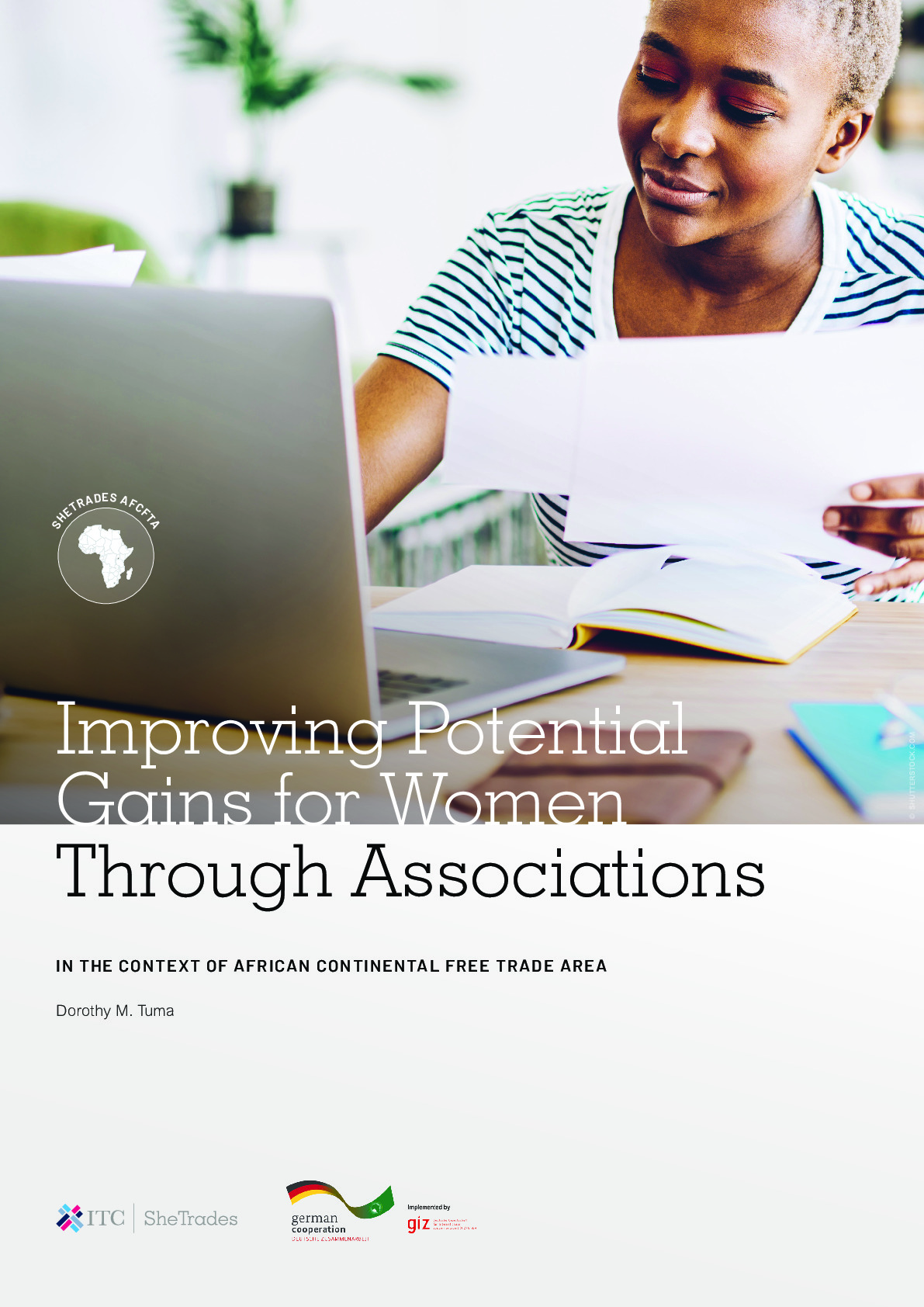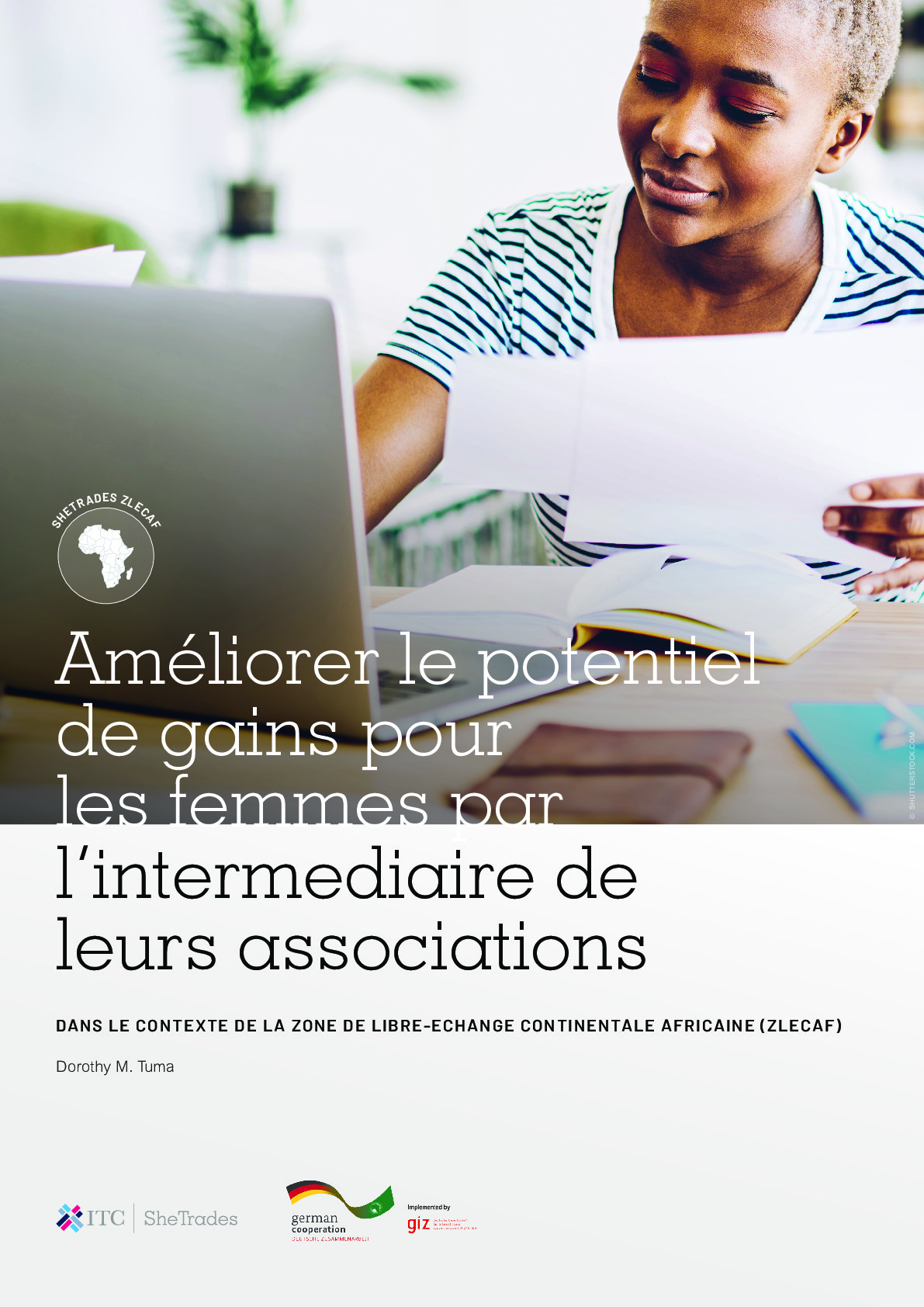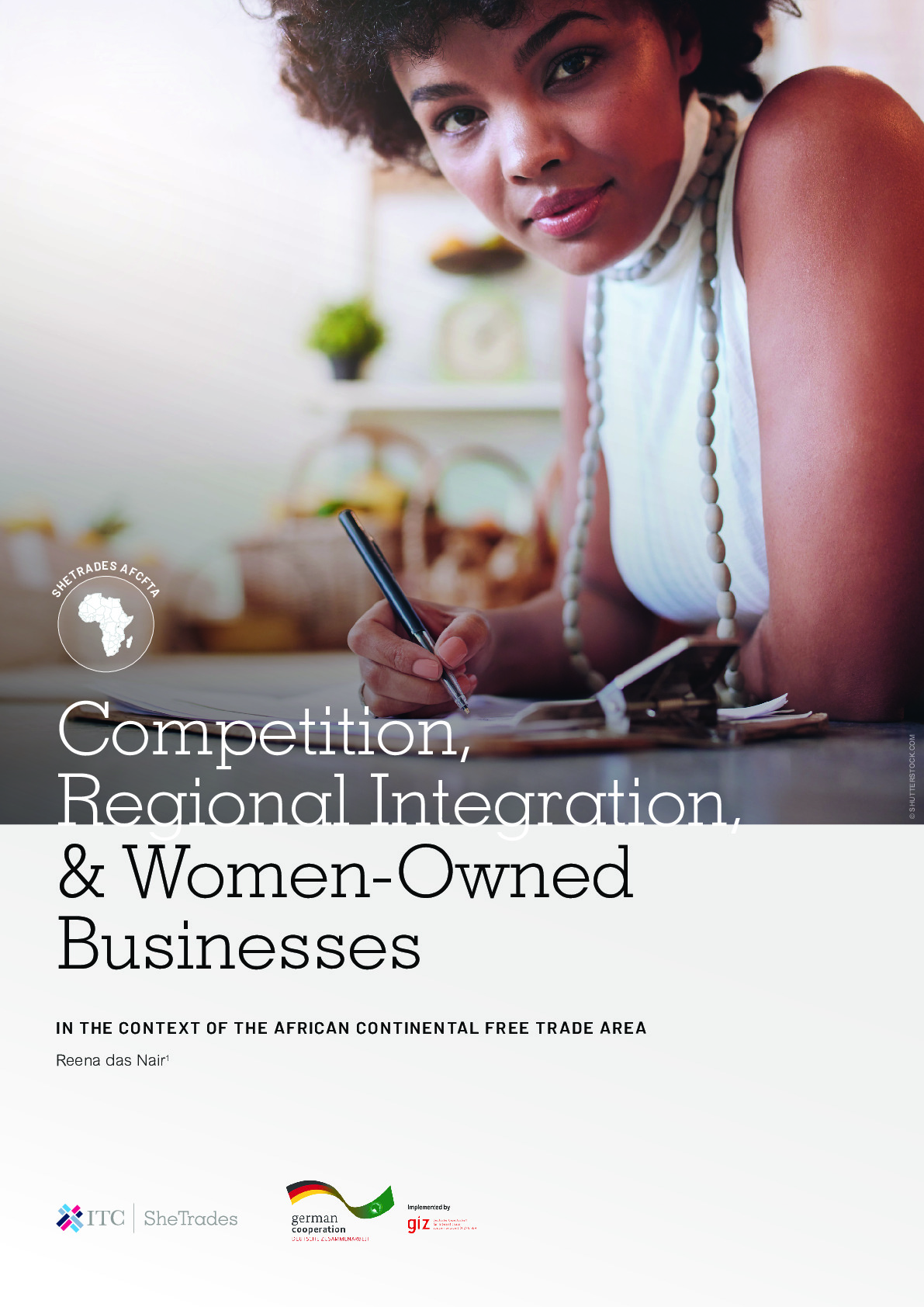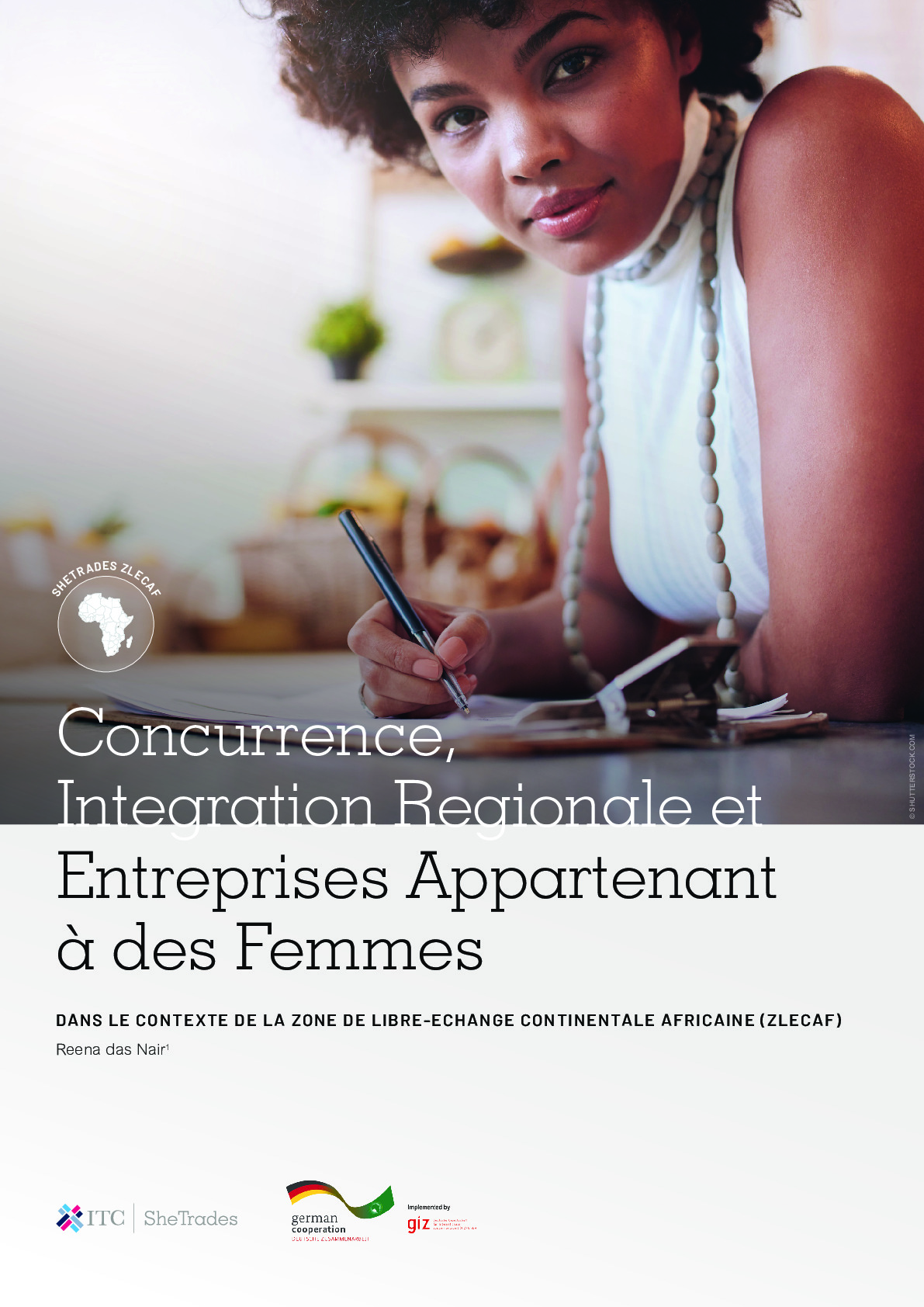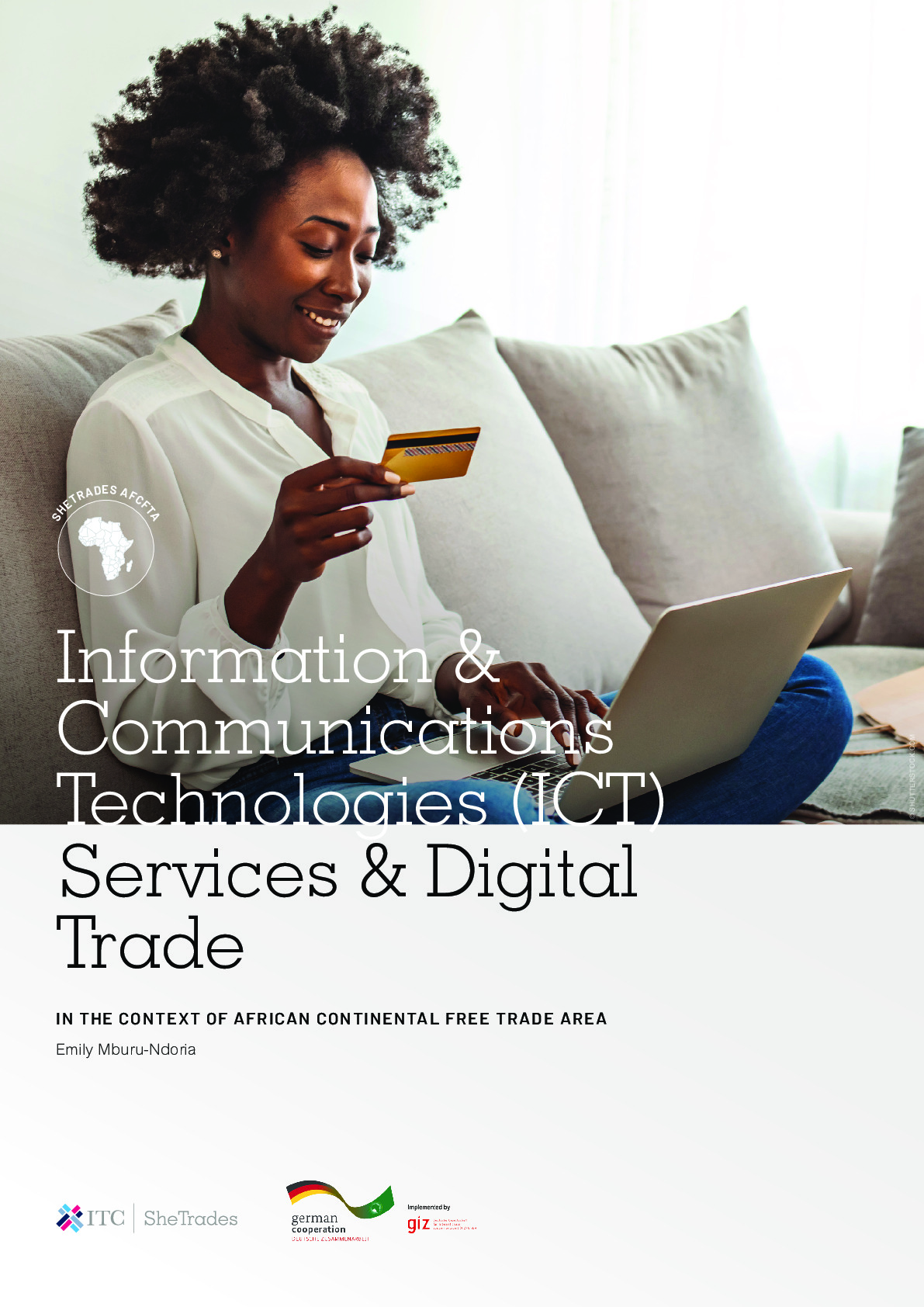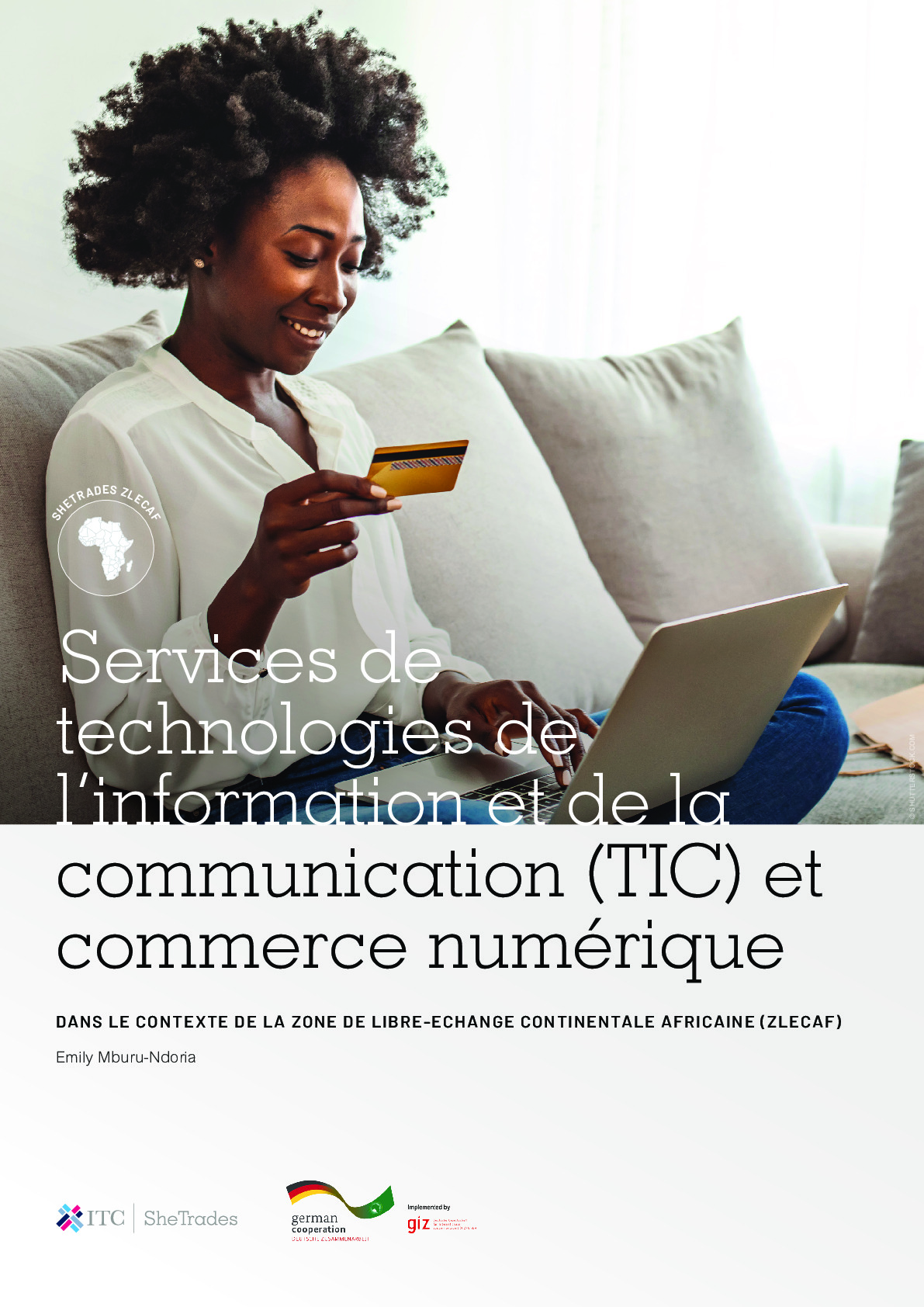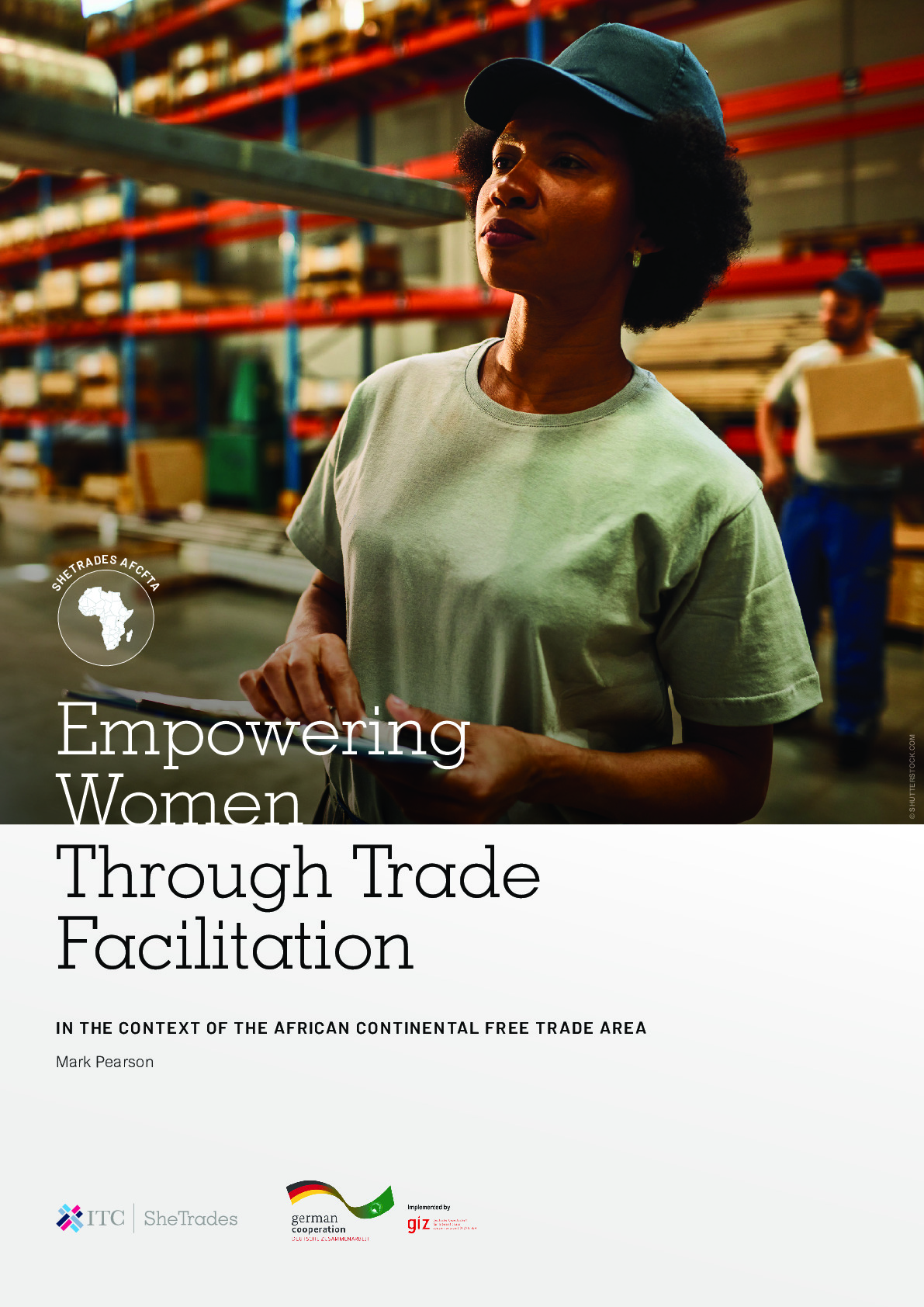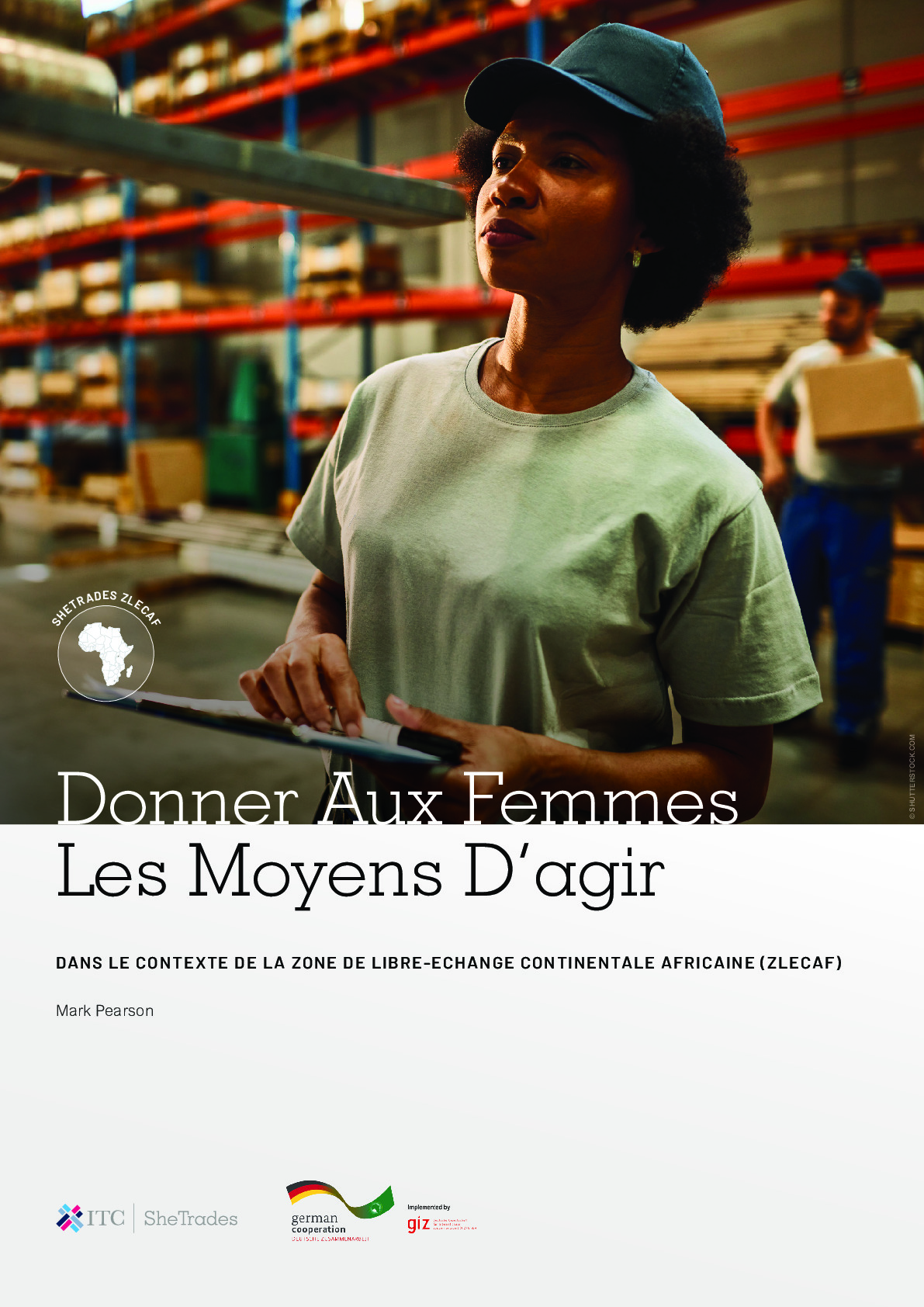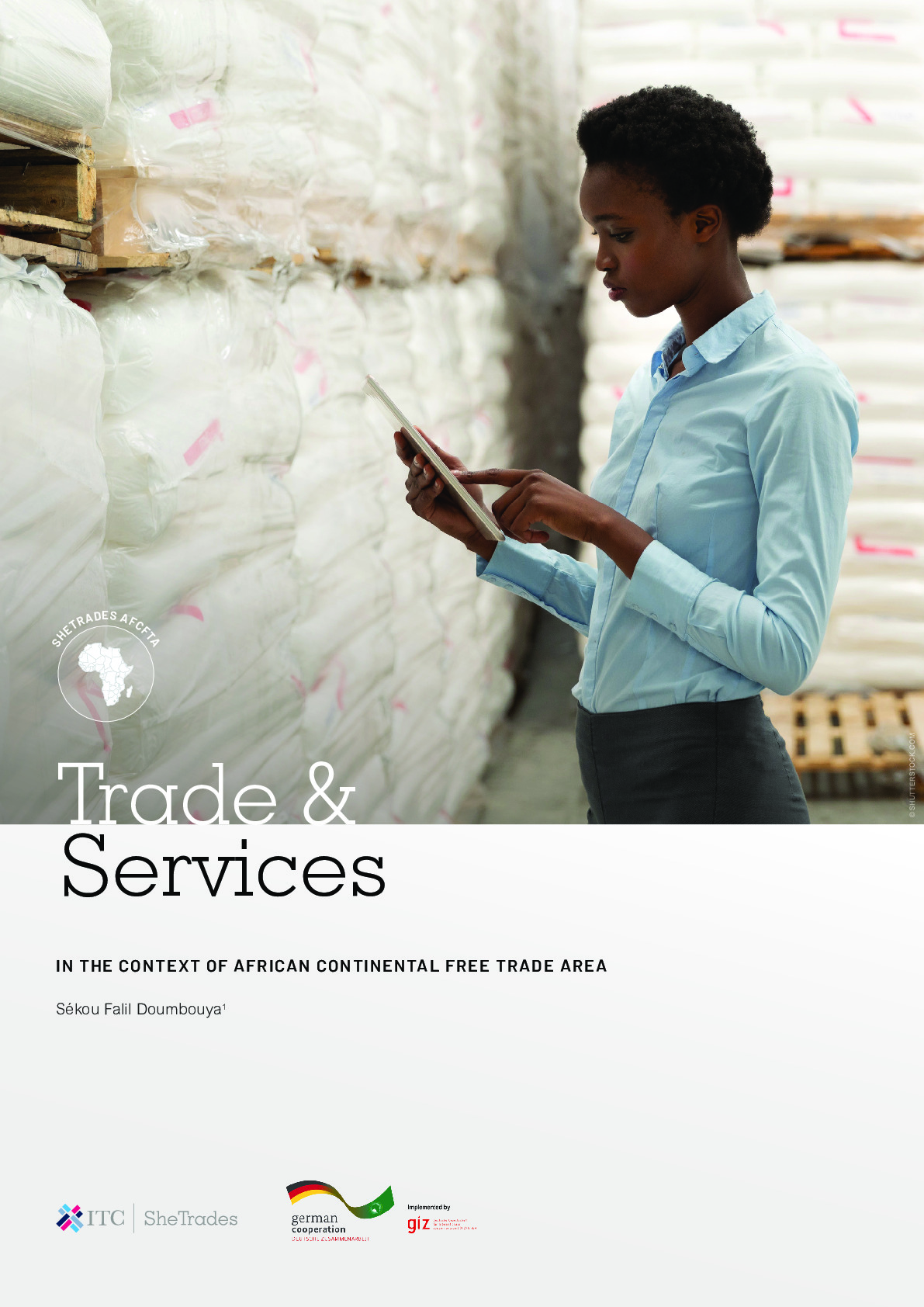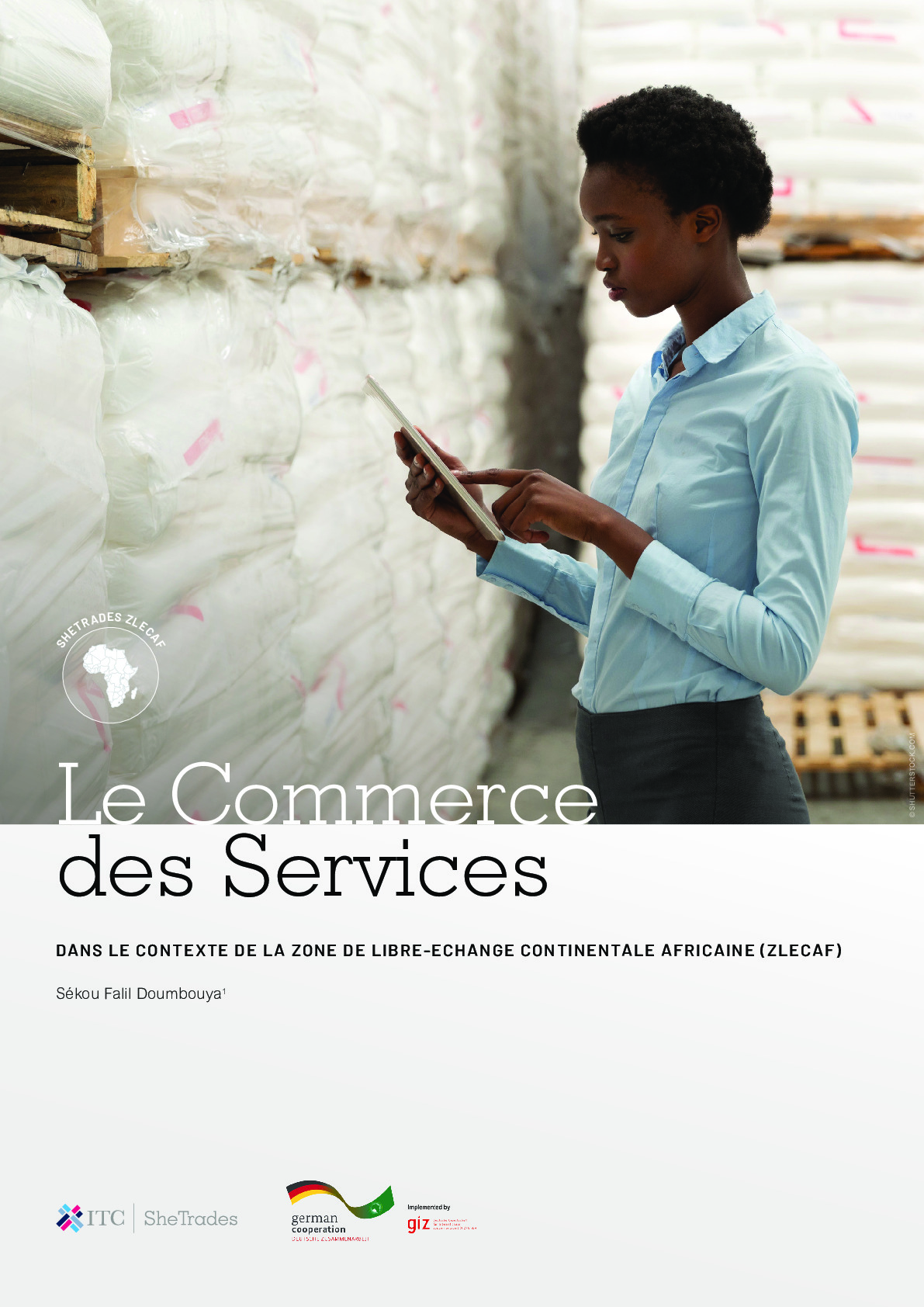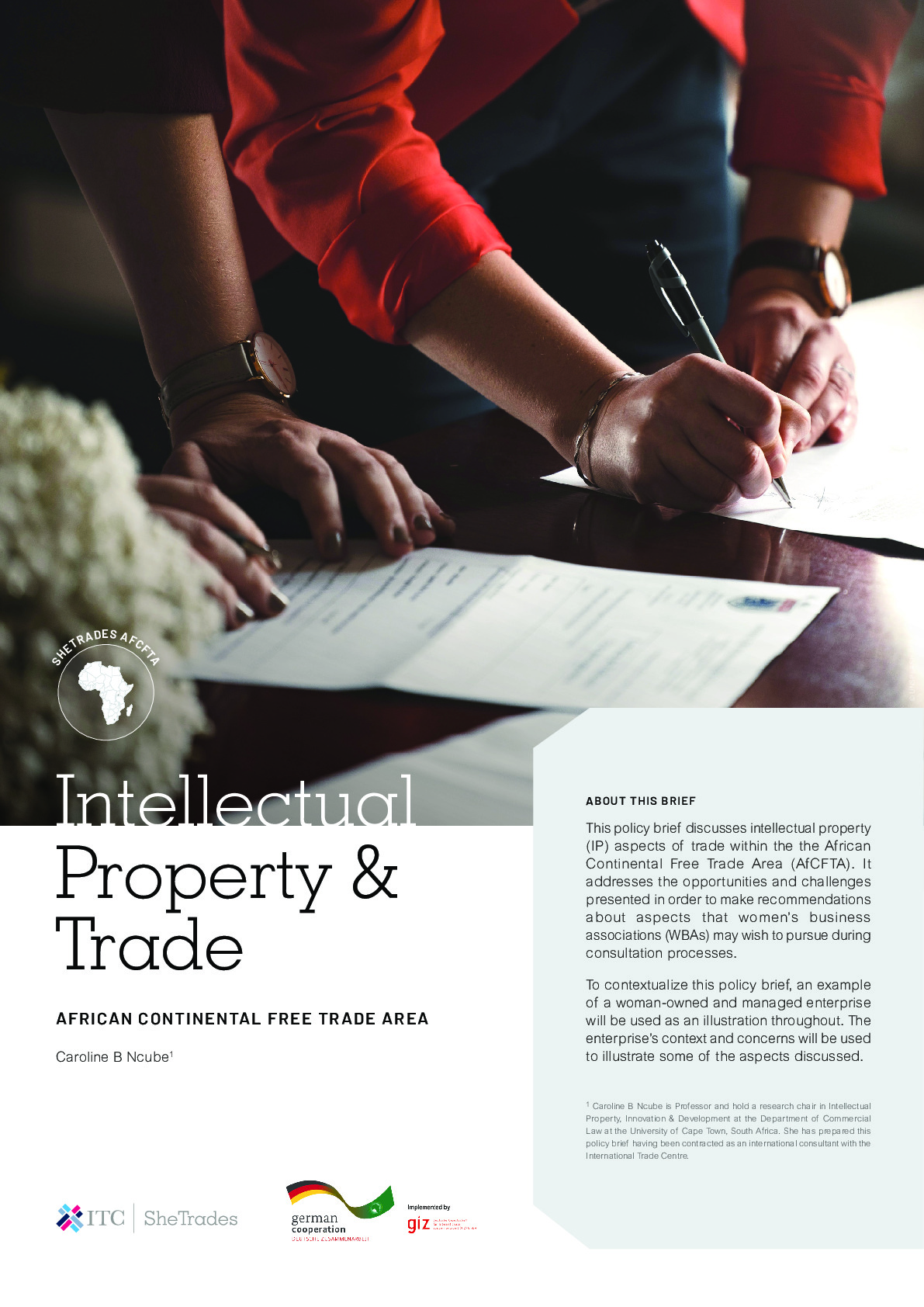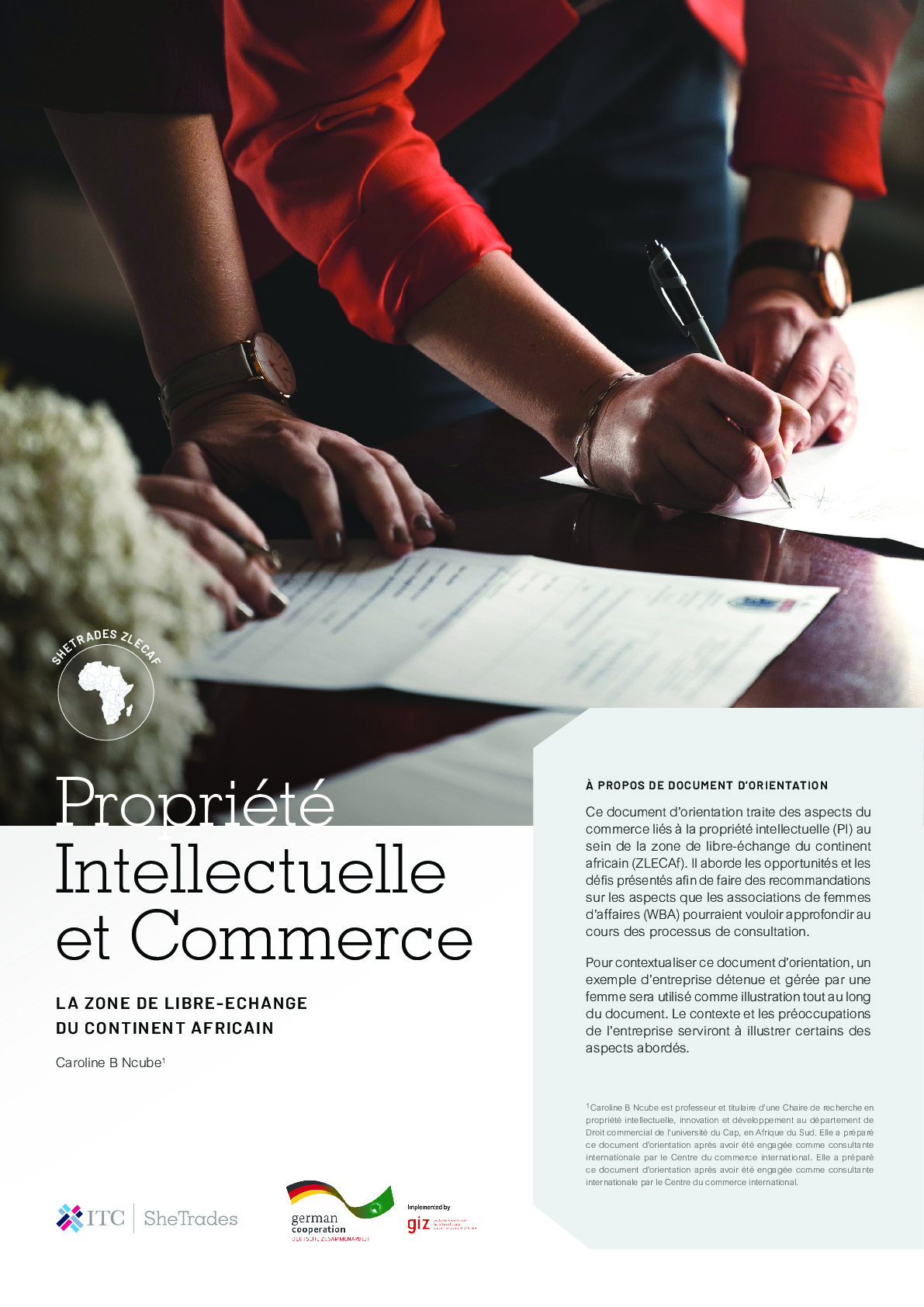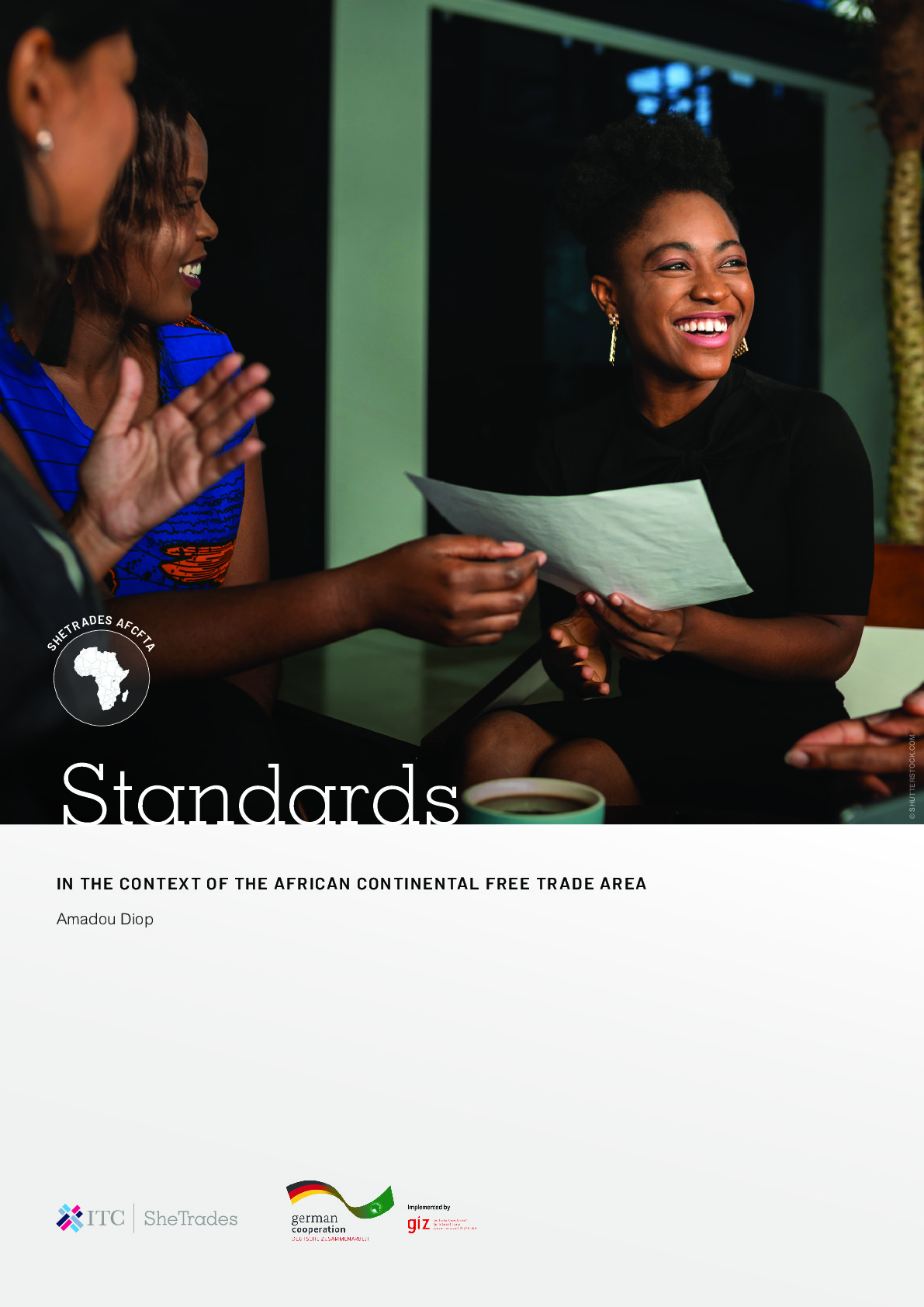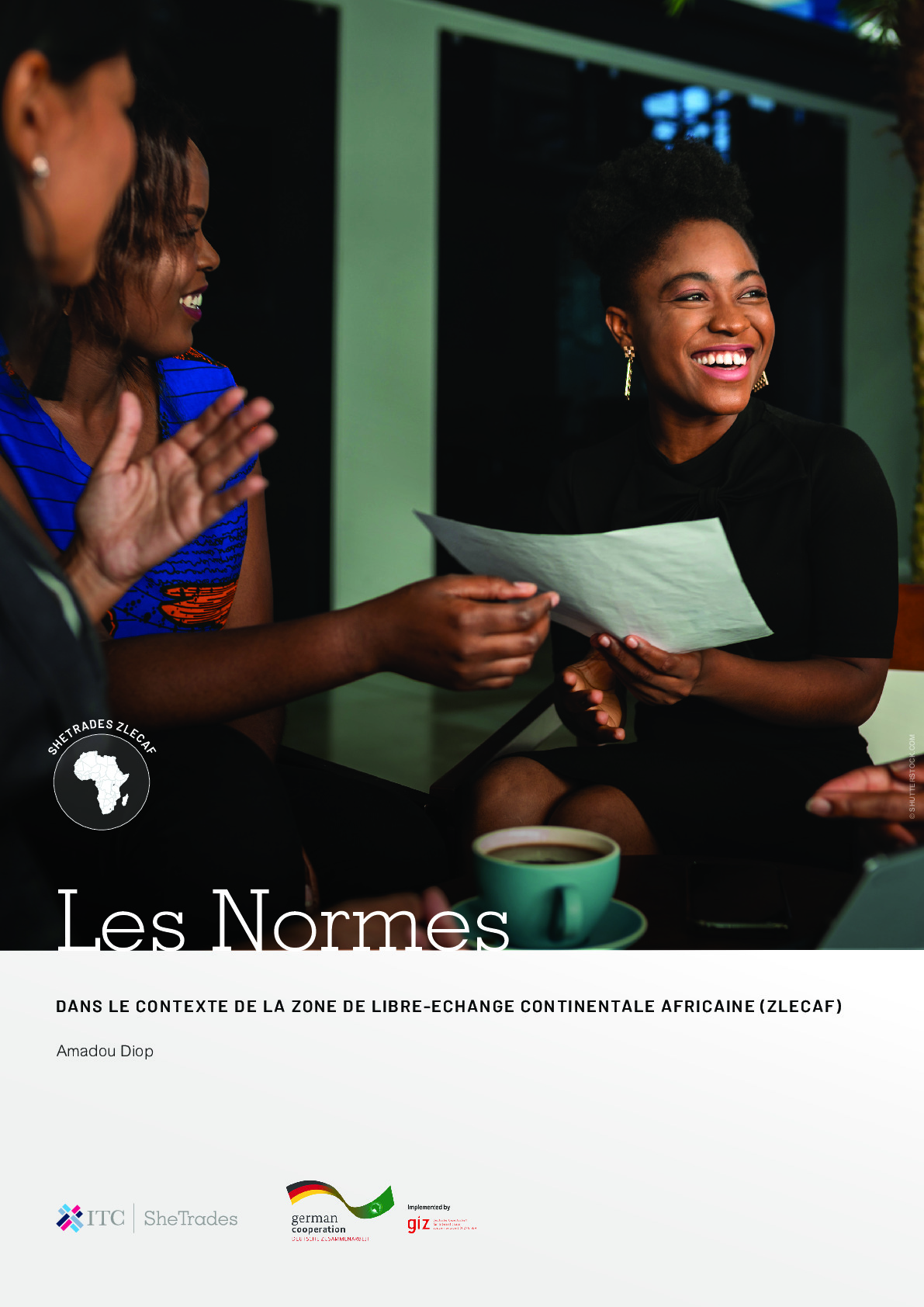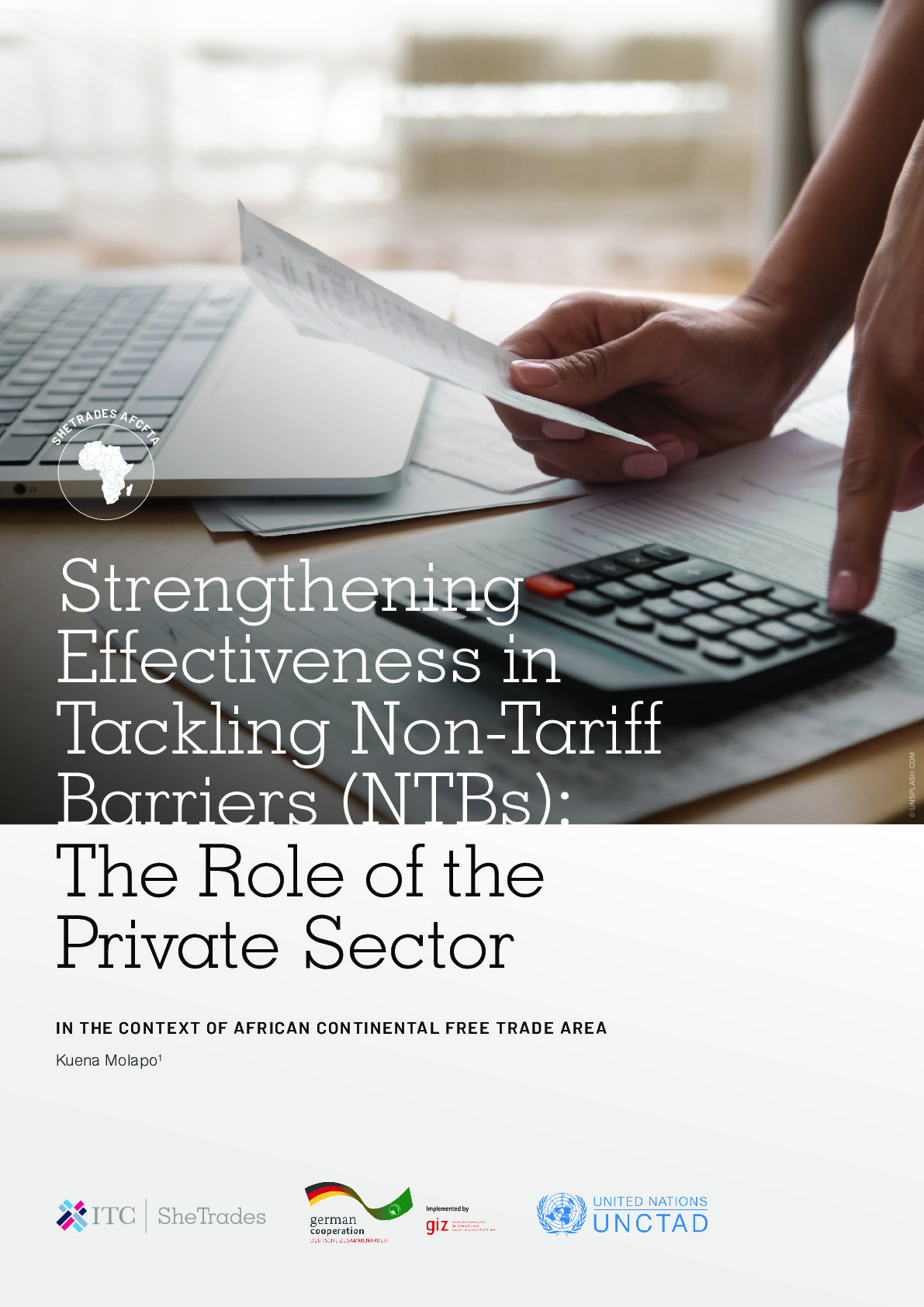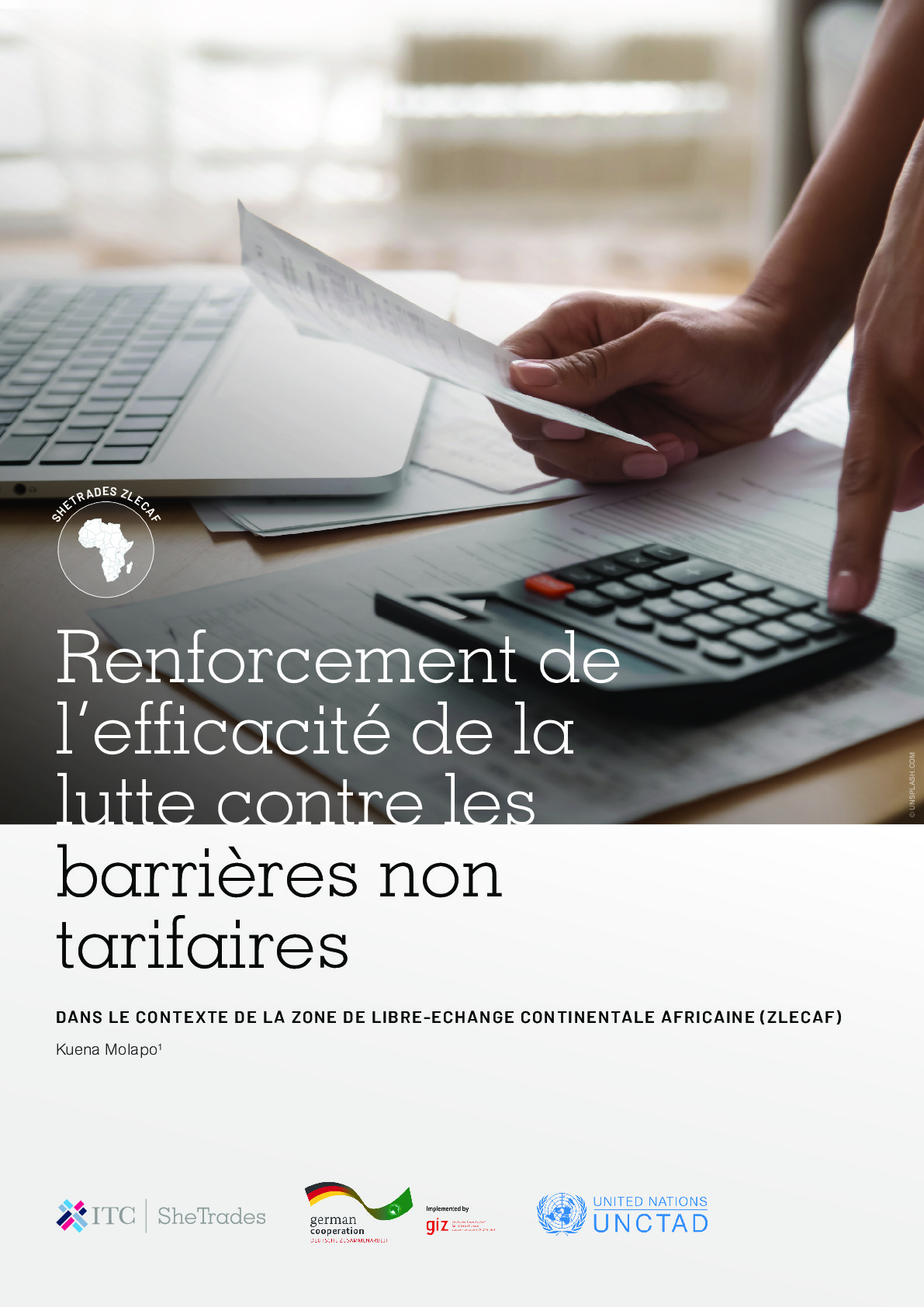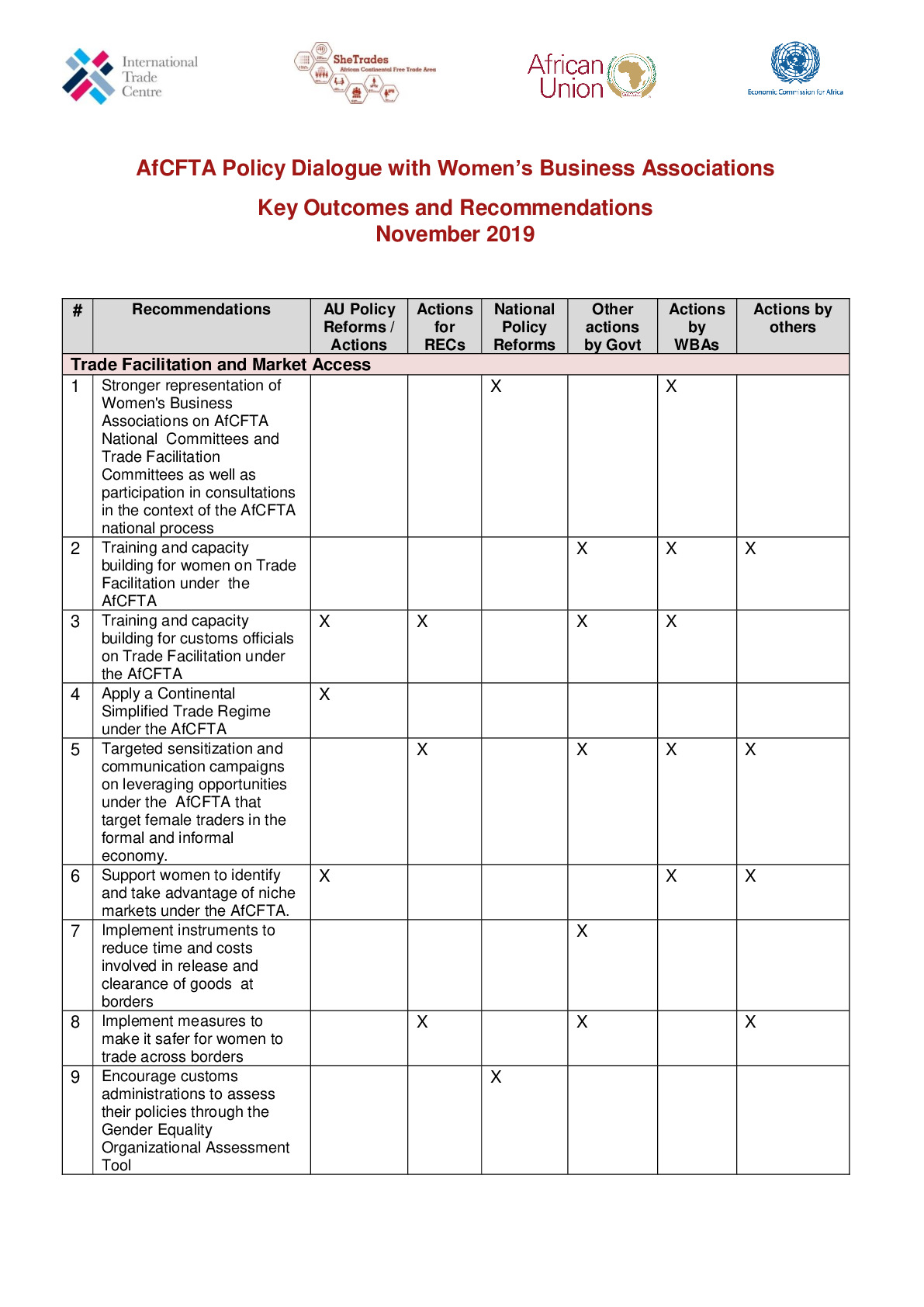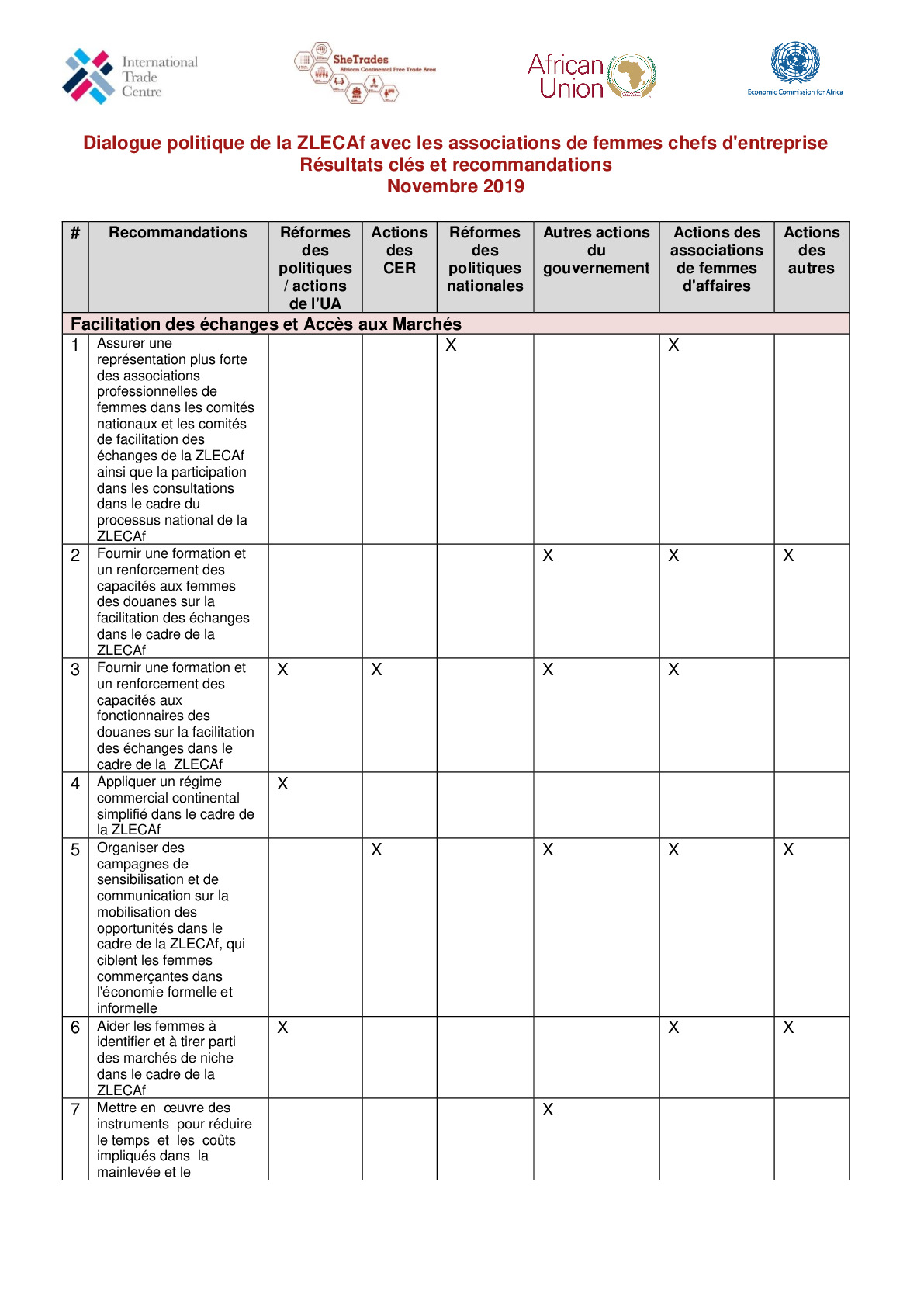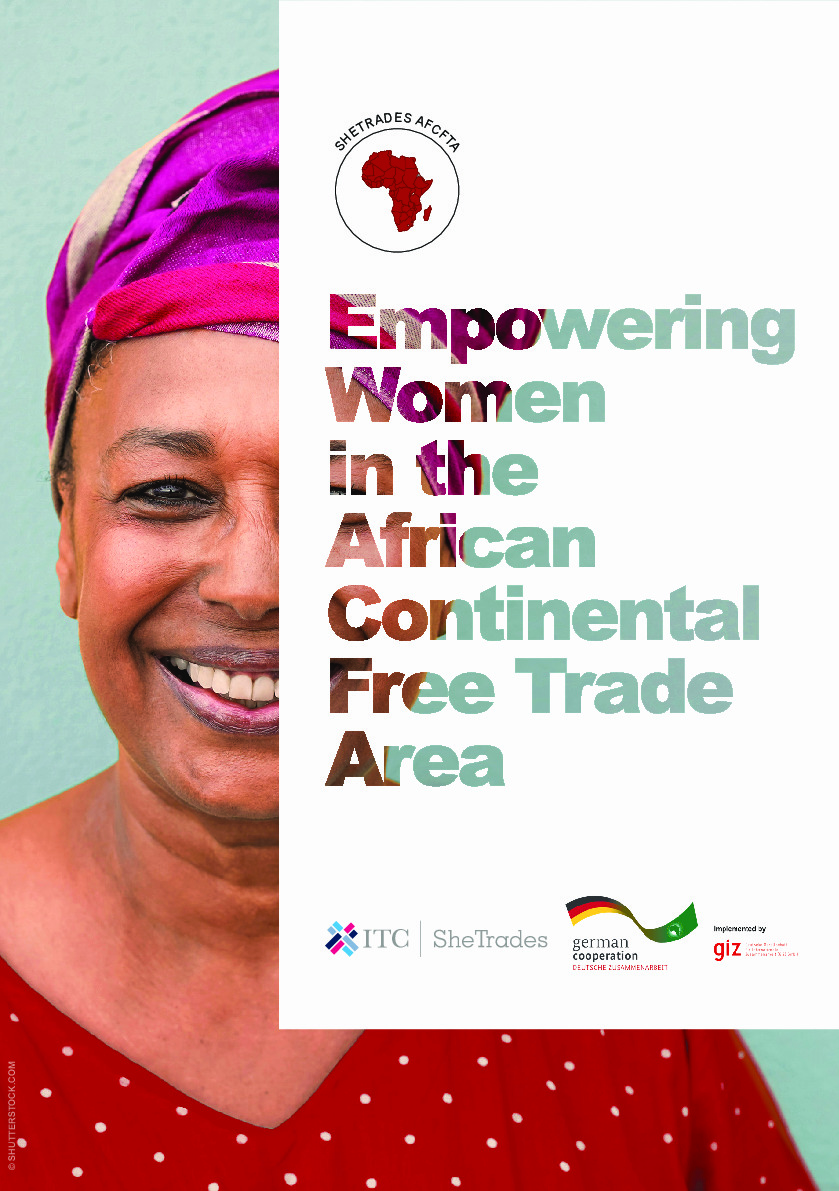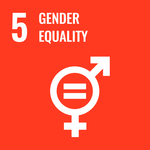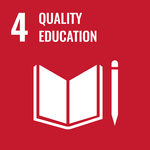Togo
ECOWAS: Strengthening agri-food trade in the region through institutional coordination and business support
Video
Agricultural trade challenges in West Africa
Malnutrition, rapid population growth, and heavy reliance on food imports are some of the key challenges facing the Economic Community of West African States (ECOWAS). Addressing these issues would foster economic development across the region. These factors also emphasize the urgent need to address food security and the effects of global geopolitical pressure on food prices.
Enhancing coordination on food trade policies within the region is paramount to tackling food security issues and mitigating the volatility of food prices. For this purpose, the ECOWAS Commission has developed various instruments, such as the ECOWAS Trade Liberalization Scheme (ETLS) and the ECOWAS Agricultural Policy (ECOWAP), aimed at boosting intra-regional agricultural trade volumes and coordination efforts.
However, recorded data on intra-regional agricultural trade volumes remains low. Customs points have Inadequate infrastructure and resources. Regional and national legislation need to be harmonized. Opaque administrative procedures lead to delays and unexpected costs. And businesses have limited information on market opportunities.
To address these issues, which are often at the origin of informal trade practices, the EAT programme aims to foster an environment conducive to intra-regional agricultural trade. It seeks to improve the capacity of policymakers to make informed decisions on trade and food security matters, strengthen regulatory frameworks, and streamline administrative procedures at the border to ensure the safety and quality of traded goods. Additionally, it aims to equip agri-food businesses with the tools and knowledge needed to better trade within the region, with a specific focus on gender and youth inclusion.
How we work
Within the framework of the EAT programme, ITC implements a multi-level and multi-stakeholder strategy, closely collaborating with the ECOWAS Commission, Member States, civil society, the private sector, and various trade entities. This holistic approach addresses the political, economic, gender, climate, food, and nutrition security aspects of regional agricultural trade.
ITC’s commitment under the EAT programme reflects its broader objectives. Those include bolstering regional institutions in Africa, promoting gender-sensitive and sustainable agricultural trade and enhancing local trade promotion services for the private sector to ensure the sustainability of the action.
ITC will provide advice and assistance to reinforce the ECOWAS Commission's capacity in coordinating agricultural trade policies, by facilitating public-private dialogues, introducing trade intelligence and monitoring tools, as well as advocating for cooperative trade facilitation approaches.
Regional organizations and national authorities will undergo tailored capacity-building programmes to improve their services to businesses and to ensure the application of agricultural trade measures at the border, with particular attention to testing their efficacy. The whole action is ultimately tailored to benefit small businesses and small agricultural traders, by upscaling their skills and providing them with a more conducive ecosystem for trading within the region.
Programme outputs
Trade Policy Harmonization: Advising the ECOWAS Commission and Member States on the coordination and harmonization of policies and initiatives to improve the region’s agricultural trade ecosystem.
Trade Facilitation: Supporting the implementation of gender-sensitive and sustainable trade facilitation measures and services at the border to unleash the potential of intra-regional agricultural trade and increase incentives to conduct formal trade operations.
Private Sector Promotion: Equipping small businesses and small agricultural traders, in collaboration with local business support organizations, with the knowledge and skills needed to tap into the opportunities offered by the regional agricultural market.
Target countries and sectors
Aside from regional policy interventions, the EAT programme focuses on field activities in Benin, Burkina Faso, Côte d'Ivoire, Ghana, Niger and Nigeria to establish a methodology that can later be applied throughout the entire region.
Product sectors targeted by the initiative were identified keeping in mind their importance as staple food, the risk of value loss due to their perishability, as well as the comparative advantages offered by the region. These include cassava, corn, fertilizer, onion, pineapple, processed meat, rice and tomato.
Main partners and beneficiaries
The programme is implemented under the guidance of the ECOWAS Commission, involving directorates overseeing agriculture and rural development, trade, customs, free movement of people, and the Gender Development Center. ITC is an implementing partner, alongside GIZ and the OECD Sahel and West Africa Club (SWAC). Additional partners encompass regional and national trade associations, chambers of commerce and agriculture, pertinent national ministries and authorities, civil society organizations, and private sector stakeholders. Directly benefiting small businesses, cooperatives, and associations of small-scale cross-border traders operating in the agri-food sector.
<p>The ECOWAS Agricultural Trade (EAT) programme, funded by the Federal Ministry of Economic Cooperation and Development (BMZ), "One World – No Hunger" special initiative, is a crucial component of the German-ECOWAS cooperation and implemented by The Deutsche Gesellschaft für Internationale Zusammenarbeit GmbH (GIZ) and The International Trade Centre (ITC). This initiative is designed to tackle regional policy coordination, economic integration and food security, focusing on enhancing intra-ECOWAS agro-food-trade.</p><p><br></p>
OIC: Trade and market intelligence for ICDT
Sustainable Development Goals
<p>The project will strengthen ICDT services on trade intelligence to support the public and private sector from the Organisation of Islamic Cooperation (OIC) to make better informed decisions and, in the long term, to contribute to an increase of trade between OIC Member States through the embedding of Market Analysis Tools, the development of an online Trade Helpdesk and the development of trade-related studies.</p>
AfCFTA: Empowering women in the AfCFTA - Phase 2 (SheTrades)
Making the AfCFTA work for women entrepreneurs and producers
A 2020 ITC survey of 70 African women's business associations found that 70% of them have not been meaningfully involved in negotiations and their members are not taking advantage of existing regional trade agreements.
To make the AfCFTA work for women, SheTrades adopts a four-pronged approach to engage with African women and their business associations, and to promote their participation in and shaping of the AfCFTA:
- Developed 9 policy briefs on priorities for women in trade facilitation, non-tariff barriers, standards, trade in services, ICTs & digital trade, strengthening women’s associations, investment, competition, intellectual property, and e-commerce.
- Published 44 recommendations on Phase I issues for women in the AfCFTA
- Mobilized more than 50 women’s business associations across the continent
- Organized peer-to-peer and knowledge-sharing sessions
- Kicked-off the development of a formal network
- Supported women’s business associations with training on sustainable business development models, governance of associations, service portfolio development, and risk management
- Bolstered policy advocacy skills
- Provided technical assistance and capacity building on gender-mainstreaming into AfCFTA national strategies
- Supported national-level consultations on gender issues and the AfCFTA
The SheTrades Initiative has developed a range of AfCFTA-related resources for women entrepreneurs, women’s business associations, and policymakers:
Publications
Policy Briefs
Recommendations
SheTrades AfCFTA brochure
Sustainable Development Goals
<p><span lang="EN-GB">Given the AfCFTA's potential to foster regional value chains and its ambition to encompass goods, services, intellectual property, competition and investment, it is critical that women are well-positioned to seize opportunities in regional trade. </span><span lang="EN-GB">The project,<strong> SheTrades: Empowering Women in the African Continental Free Trade Area—Phase II, </strong>contributes to <strong>ITC One Trade Africa strategy</strong> on African regional integration. It aims to empower women entrepreneurs<span> </span>to benefit from trade opportunities created by the AfCFTA. The project will help design a more inclusive AfCFTA by providing women’s business associations with capacity-building, networking platforms and support for effective policy advocacy on AfCFTA Phase II issues; leveraging the private sector to foster women’s economic empowerment through the AfCFTA; working with ECOWAS to strengthen the ecosystem for women; and promoting public private sector dialogues on women and trade across selected countries. </span></p>
Supportive business ecosystem: Institutions and Ecosystems for Business Support
Sustainable Development Goals
<p><a name="_Hlk155357558"><span style="color: rgb(97, 189, 109);">Business support organizations (BSOs) are critical actors in an ecosystem of business support, categorized by the formal and informal connections among service providers that recognises and takes advantage of shared objectives and complementary strengths.</span></a></p><p><span style="color: rgb(97, 189, 109);">ITC has developed a unique centre of excellence in the establishment, improvement and connectedness of business support organizations. This work with BSOs is embedded as a core service area for ITCs strategy and recognises the role that BSOs play in delivering results to all stakeholders through their ability to create scale, systemic change and sustained results</span></p><p><span style="color: rgb(97, 189, 109);">In this strategic cycle (22-25), ITC will continue to serve a broad range of BSOs including those active in ITC’s priority impact areas of youth entrepreneurship, green trade, digitalisation and gender, with managerial and operational solutions, but also invest more in ecosystem level interventions, and make use of digital channels for efficiency, scale and value.</span></p><p><span style="color: rgb(97, 189, 109);">This docu<span>ment sets out a 4-year perspective (2022-20225) and 4 strategic objectives for supportive business ecosystems with, specific outputs and activities describing the year-on-year contribution of W1 funding to the strategic core service area 2.</span></span></p>
Togo: Facilitation d'un meilleur accès aux marchés internationaux – (AMI Commerce Togo)
Sustainable Development Goals
<p>AMI Togo project aims to improve trade by reducing barriers and enhancing transparency. It has three key outcomes:</p><ol><li>Identifying and reducing trade obstacles through stakeholder engagement and prioritization.</li><li>Strengthening Togo's trade obstacle resolution mechanism (MAOC).</li><li>Facilitating international trade for Togolese SMEs through a trade facilitation portal (PFE) and simplifying administrative procedures.</li></ol><p>The project seeks to create a more efficient and accessible trade environment, benefiting Togo's private sector and promoting economic growth.</p>
UEMOA: Projet de développement des exportations sous AGOA
<p>Pour le kit didactique, l'ITC s'appuiera sur un consultant spécialiste de la chaine de valeur de la tomate au sénégal qui développera avec les experts ITC le contenu du kit sur la base de consultations menées avec les differents acteurs. La vidéo et le livret sera ensuite réalisé par une entreprise de réalisation de film.</p><p>Le guide de pénétration sera développé avec l'appui de consultants nationaux chargés d'identifier les procédures et les régles pour exporter vers le marché américain sous le r´€gime américain. Un consultant américain sera recruté en parallèle pour identifier les circuits de distribution des produits sélectionnés.</p>
Togo: Renforcement des capacités productives et commerciales de la filière soja
Sustainable Development Goals
AfCFTA Export Training Programme for African SMEs
Sustainable Development Goals
<p>This project document proposes the establishment and piloting of a blended, non-accredited, vocational and practical training programme concentrated around the fundamentals of exporting and the opportunities resulting from the AfCFTA. This curriculum will be developed by the SME Trade Academy in collaboration with the Afreximbank.</p><p>Local partners, such as trade training institutions will provide support in implementation of the pilot programme in three countries, namely Nigeria, Rwanda and Côte d'Ivoire.</p><p>The pilot will involve building local partners’ capacity to market the training and conduct sessions on a continuous basis, localizing the offering for each national context.</p><p>An <span style="color: rgb(0, 0, 0);">expansion phase</span> has been added to the project involving a further 12 countries. The online training will be opened to all African countries.</p><p>A second expansion phase has been added to the project involving the delivery of national workshops for 4 additional countries following a new agreement signed with the ITFC.</p>





